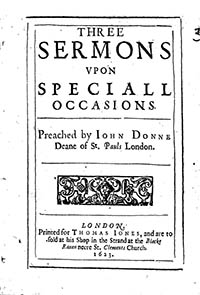 A
A
SERMON
VPON
THE XV. VERSE
OF THE XX. CHAP-
TER OF THE BOOKE
OF IVDGES Wherein occasion was iustly taken for the Publication
of some Reasons, which his Sacred MAIESTIE
had beene pleased to giue, of those Directions
for PREACHERS, which he had
formerly sent forth. Preached at the CROSSE the 15th. of September.
1622. By IOHN DONNE, Doctor of Diuinitie and Deane
of Saint PAVLS, London. And now by commandement of his Majestie
published, as it was then preached. LONDON
Printed by William Stansby for Thomas Iones, and are to
be sold at his shop in the Strand at the blacke
Rauen, neere vnto Saint Cle-
ments Church.
1622.
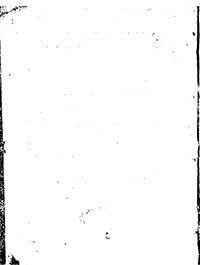
 TO
TO THE RIGHT
HONORABLE,
GEORGE,
Marquesse of Buckingham,
High ADMIRALL of
ENGLAND, &c. WHen I would
speake to the
KING, by your
LORDSHIPS
Meanes, I doe:
Now, when I
would speake to
the Kingdom, I would do that by your A3 Lord.
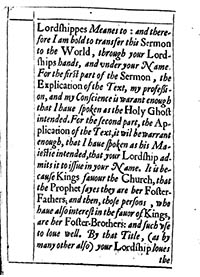
Lordshippes Meanes to: and there-
fore I am bold to transfer this Sermon
to the World, through your Lord-
ships hands, and vnder your Name.
For the first part of the Sermon, the
Explication of the Text, my professi-
on, and my Conscience is warant enough
that I haue spoken as the Holy Ghost
intended. For the second part, the Ap-
plication of the Text, it wil be warrant
enough, that I haue spoken as his Ma-
iestie intended, that your Lordship ad-
mits it to issue in your Name. It is be-
cause Kings fauour the Church, that
the Prophet sayes they are her Foster-
Fathers; and then, those persons, who
haue also interest in the fauor of Kings,
are her Foster-Brothers: and such vse
to loue well. By that Title, (as by
many other also) your Lordship loues the
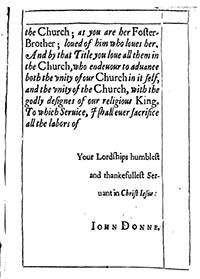
the Church; as you are her Foster-
Brother; loued of him who loues her.
And by that Title you loue all them in
the Church, who endeuour to aduance
both the vnity of our Church in it self,
and the vnity of the Church, with the
godly designes of our religious King.
To which Seruice, I shall euer sacrifice
all the labors of
Your Lordships humblest
and thankefullest Ser-
uant in Christ Iesus:
IOHN DONNE.
 1
1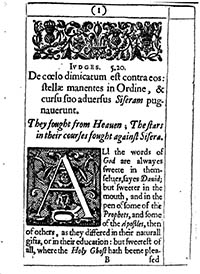
IVDGES. 5. 20. De coelo dimicatum est contra eos:
stellæ manentes in Ordine, &
cursu suo aduersus Siseram pug-
nauerunt.
They fought from Heauen; The stars
in their courses fought against Sisera.
ALll the words of
God are alwayes
sweete in them-
selues, sayes Dauid;
but sweeter in the
mouth, and in the
pen of some of the
Prophets, and some
of the Apostles, then
of others, as they differed in their naturall
gifts, or in their education: but sweetest of
all, where the Holy Ghost hath beene plea-
B sed 2
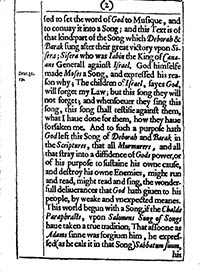 sed to set the word of God to
Musique, and
sed to set the word of God to
Musique, and to conuay it into a Song; and this Text is of
that kind: part of the Song which Deborah &
Barak sung after their great victory vpon Si-
sera; Sisera who was Iabin the King of Cana-
ans Generall against Israel. God himselfe
made Moses a Song, Deut. 31.
19. and expressed his rea-
son why; The children of Israel, sayes God,
will forget my Law; but this song they will
not forget; and whensoeuer they sing this
song, this song shall testifie against them,
what I haue done for them, how they haue
forsaken me. And to such a purpose hath
God left this Song of Deborah and Barak in
the Scriptures, that all Murmurers, and all
that stray into a diffidence of Gods power, or
of his purpose to sustaine his owne cause,
and destroy his owne Enemies, might run
and read, might read and sing, the wonder-
full deliuerances that God hath giuen to his
people, by weake and vnexpected meanes.
This world begun with a Song, if the Chalde
Paraphrasts, vpon Salomons Song of Songs
haue taken a true tradition; That as soone as
Adams sinne was forgiuen him, he expres-
sed (as he cals it in that Song) Sabbatum suum, his 3
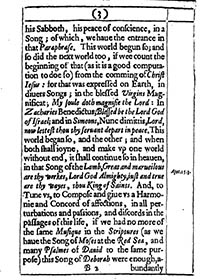
his Sabboth, his peace of conscience, in a
Song; of which, we haue the entrance in
that Paraphrase. This world begun so; and
so did the next world too, if wee count the
beginning of that (as it is a good computa-
tion to doe so) from the comming of Christ
Iesus: for that was expressed on Earth, in
diuers Songs; in the blessed Virgins Mag-
nificat; My soule doth magnifie the Lord: In
Zacharies Benedictus; Blessed be the Lord God
of Israel; and in Simeons, Nunc dimittis, Lord,
now lettest thou thy seruant depart in peace. This
world began so, and the other; and when
both shall ioyne, and make vp one world
without end, it shall continue so in heauen,
in that Song of the Lamb, Apoc. 15.3. Great and marueilous
are thy workes, Lord God Almighty, iust and true
are thy wayes, thou King of Saints. And, to
Tune vs, to Compose and giue vs a Harmo-
nie and Concord of affections, in all per-
turbations and passions, and discords in the
passages of this life, if we had no more of
the same Musique in the Scriptures (as we
haue the Song of Moses at the Red Sea, and
many Psalmes of Dauid to the same pur-
pose) this Song of Deborah were enough, a-
B2 bundantly 4
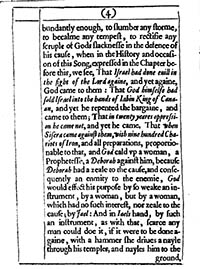 bundantly enough, to slumber any storme,
bundantly enough, to slumber any storme, to becalme any tempest, to rectifie any
scruple of Gods slacknesse in the defence of
his cause, when in the History and occasi-
on of this Song, expressed in the Chapter be-
fore this, we see, That Israel had done euill in
the fight of the Lord againe, and yet againe,
God came to them: That God himselfe had
sold Israel into the hands of Iabin King of Cana-
an, and yet he repented the bargaine, and
came to them; That in twenty yeeres oppressi-
on he came not, and yet he came. That when
Sisera came against them, with nine hundred Cha-
riots of Iron, and all preparations, proportio-
nable to that, and God cald vp a woman, a
Prophetesse, a Deborah against him, because
Deborah had a zeale to the cause, and conse-
quently an enmity to the enemie, God
would effect his purpose by so weake an in-
strument, by a woman, but by a woman,
which had no such interest, nor zeale to the
cause; by Jael: And in Iaels hand, by such
an instrument, as with that, scarce any
man could doe it, if it were to be done a-
gaine, with a hammer she driues a nayle
through his temples, and nayles him to the ground 5
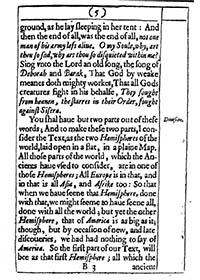
ground, as he lay sleeping in her tent: And
then the end of all, was the end of all, not one
man of his army left aliue. O my Soule, why, art
thou so sad, why art thou so disquieted within me?
Sing vnto the Lord an old song, the song of
Deborah and Barak, That God by weake
meanes doth mighty workes, That all Gods
creatures fight in his behalfe, They fought
from heanenheauen, the starres in their Order, fought
against Sisera. You shal haue but two parts out of these
words; And to make these two parts, Diuision. I con-
sider the Text, as the two Hemispheres of the
world, laid open in a flat, in a plaine Map.
All those parts of the world, which the An-
cients haue vsed to consider, are in one of
those Hemispheres; All Europe is in that, and
in that is all Asia, and Afrike too: So that
when we haue seene that Hemisphere, done
with that, we might seeme to haue seene all,
done with all the world; but yet the other
Hemisphere, that of America is as big as it;
though, but by occasion of new, and late
discoueries, we had had nothing to say of
America. So the first part of our Text, will
bee as that first Hemisphere; all which the B3 ancient 6
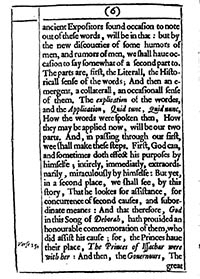
ancient Expositors found occasion to note
out of these words, will be in that: but by
the new discoueries of some humors of
men, and rumors of men, we shall haue oc-
casion to say somewhat of a second part to.
The parts are, first, the Literall, the Histo-
ricall sense of the words; And then an e-
mergent, a collaterall, an occasionall sense
of them. The explication of the wordes,
and the Application, Quid tunc, Quid nunc,
How the words were spoken then, How
they may be applied now, will be our two
parts. And, in passing through our first,
wee shall make these steps. First, God can,
and sometimes doth effect his purposes by
himselfe; intirely, immediatly, extraordi-
narily, miraculously by himselfe: But yet,
in a second place, we shall see, by this
story, That he lookes for assistance, for
concurrence of second causes, and subor-
dinate meanes: And that therefore, God
in this Song of Deborah, hath prouided an
honourable commemoration of them, who
did assist his cause; for, the Princes haue
their place, Verse 15,. The Princes of Issachar were
with her: And then, the Gouernours, The great 7
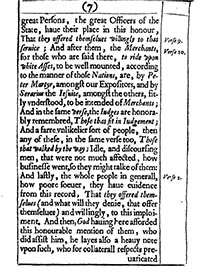
great Persons, the great Officers of the
State, haue their place in this honour,
Verse 9. That they offered themselues willingly to that
seruice; And after them, Verse 10,. the Merchants,
for those who are said there, to ride vpon
white Asses, to be well mounted, according
to the manner of those Nations, are, by Pe-
ter Martyr, amongst our Expositors, and by
Serarius the Iesuite, amongst the others, fit-
ly vnderstood, to be intended of Merchants;
And in the same verse, the Iudges are honora-
bly remembred, Those that sit in Iudgement;
And a farre vnlikelier sort of people, then
any of these, in the same verse too, Those
that walked by the way; Idle, and discoursing
men, that were not much affected, how
businesse went, so they might talke of them:
And lastly, the whole people in generall,
Verse 2. how poore soeuer, they haue euidence
from this record, That they offered them-
selues (and what will they denie, that offer
themselues) and willingly, to this imploi-
ment. And then, God hauing here afforded
this honourable mention of them, who
did assist him, he layes also a heauy note
vpon such, who for collaterall respects pre-
uaricated 8
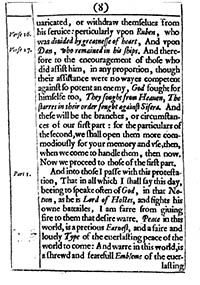 uaricated, or withdraw themselues from
uaricated, or withdraw themselues from
his seruice: perticularly vpon Ruben, Verse 16. who
was diuided by greatnesse of heart, And vpon
Dan, Verse 17. who remained in his ships. And there-
fore to the encouragement of those who
did assist him, in any proportion, though
their assistance were no wayes competent
against so potent an enemy, God fought for
himselfe too, They fought from Heauen, The
starres in their order fought against Sisera. And
these will be the branches, or circumstan-
ces of our first part: for the particulars of
the second, we shall open them more com-
modiously for your memory and vse, then,
when we come to handle them, then now.
Now we proceed to those of the first part. lasting And into those I passe with this protesta-
tion, Part 1. That in all which I shall say this day,
beeing to speake often of God, in that No-
tion, as he is Lord of Hostes, and fights his
owne battailes, I am farre from giuing
fire to them that desire warre. Peace in this
world, is a pretious Earnest, and a faire and
louely Type of the euerlasting peace of the
world to come: And warre in this world, is
a shrewd and fearefull Embleme of the euer C he 9
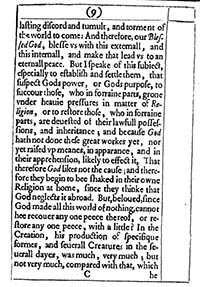 C[1]
C[1]
lasting discord and tumult, and torment of
the world to come: And therefore, our Bles-
sed God, blesse vs with this externall, and
this internall, and make that lead vs to an
eternall peace. But I speake of this subiect,
especially to establish and settle them, that
suspect Gods power, or Gods purpose, to
succour those, who in forraine parts, grone
vnder heauie pressures in matter of Re-
ligion, or to restore those, who in forraine
parts, are deuested of their lawfull posses-
sions, and inheritance; and because God
hath not done these great workes yet, nor
yet raised vp meanes, in apparance appearace , and in
their apprehension, likely to effect it, That
therefore God likes not the cause; and there-
fore they begin to bee shaked in their owne
Religion at home, since they thinke that
God neglects it abroad. But, beloued, since
God made all this world of nothing, cannot
hee recouer any one peece thereof, or re-
store any one peece, with a little? In the
Creation, his production of specifique
formes, and seuerall Creatures in the se-
uerall dayes, was much, very much; but
not very much, compared with that, which 10
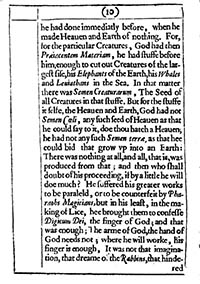
he had done immediatly before, when he
made Heauen and Earth of nothing. For,
for the particular Creatures, God had then
Præiacentem Materiam, he had stuffe before
him; enough to cut out Creatures of the lar-
gest sise, his Elephants of the Earth, his Whales
and Leuiathans in the Sea. In that matter
there was Semen Creaturarum, The Seed of
all Creatures in that stuffe. But for the stuffe
it selfe, the Heauen and Earth, God had not
Semen Coeli, any such seed of Heauen as that
he could say to it, doe thou hatch a Heauen;
he had not any such Semen terræ, as that hee
could bid that grow vp into an Earth:
There was nothing at all, and all, that is, was
produced from that; and then who shall
doubt of his proceeding, if by a little he will
doe much? He suffered his greater works
to be paraleld, or to be counterfeit by Pha-
raohs Magicians, but in his least, in the ma-
king of Lice, hee brought them to confesse
Digitum Dei, the finger of God; and that
was enough; The arme of God, the hand of
God needs not; where he will worke, his
finger is enough, It was not that imagina-
tion, that dreame of the Rabbins, that hinde-
red 11
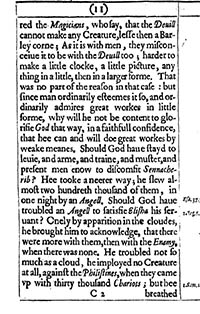 red the Magicians, who
say, that the Deuill
red the Magicians, who
say, that the Deuill
cannot make any Creature, lesse then a Bar-
ley corne; As it is with men, they miscon-
ceiue it to be with the Deuill too; harder to
make a little clocke, a little picture, any
thing in a little, then in a larger forme. That
was no part of the reason in that case: but
since man ordinarily esteemes it so, and or-
dinarily admires great workes in little
forme, why will he not be content to glo-
rifie God that way, in a faithfull confidence,
that hee can and will doe great workes by
weake meanes. Should God haue stayd to
leuie, and arme, and traine, and muster, and
present men enow to discomfit Sennache-
rib? Hee tooke a neerer way; he slew al-
most two hundreth hundredth thousand of them, in
one night by an Angell. Esa. 37.36. Should God haue
troubled an Angell to satisfie Elisha his ser-
uant? 2. Reg. 5.16. Onely by apparition in the cloudes,
he brought him to acknowledge, that there
were more with them, then with the Enemy,
when there was none. He troubled not so
much as a cloud, he imployed no Creature
at all, against the Philistines, when they came
vp with thirty thousand Chariots; 1. Sam. 23 .5 but hee C2 breathed 12
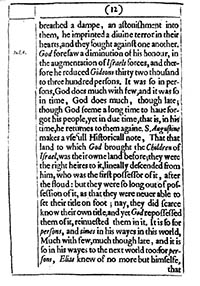
breathed a dampe, an astonishment into
them, he imprinted a diuine terror in their
hearts, and they fought against one another.
God foresaw a diminution of his honour, Iud. 6. in
the augmentation of Israels forces, and ther-
fore he reduced Gideons thirty two thousand
to three hundred persons. It was so in per-
sons, God does much with few, and it was so
in time, God does much, though late;
though God seeme a long time to haue for-
got his people, yet in due time, that is, in his
time, he returnes to them againe. S. Augustine
makes a vsefull Historicall note, That that
land to which God brought the Children of
Israel, was their owne land before; they were
the right heires to it, lineally descended from
him, who was the first possessor of it, after
the floud: but they were so long out of pos-
session of it, as that they were neuer able to
set their title on foot; nay, they did scarce
know their own title, and yet God repossessed
them of it, reinuested them in it. It is so for
persons, and times in his wayes in this world,
Much with few, much though late, and it is
so in his wayes to the next world too: for per-
sons, Elias knew of no more but himselfe, that 13
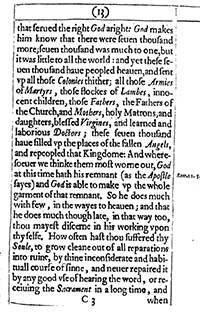
that serued the right God aright: God makes
him know that there were seuen thousand
more; seuen thousand was much to one, but
it was little to all the world: and yet these se-
uen thousand haue peopled heauen, and sent
vp all those Colonies thither; all those Armies
of Martyrs, those flockes of Lambes, inno-
cent children, those Fathers, the Fathers of
the Church, and Mothers, holy Matrons, and
daughters, blessed Virgines, and learned and
laborious Doctors; these seuen thousand
haue filled vp the places of the fallen Angels,
and repeopled that Kingdome: And where-
soeuer we thinke them most worne out, God
at this time hath his remnant (as the Apostle
Rom. 11. 5. sayes) and God is able to make vp the whole
garment of that remnant. So he does much
with few, in the wayes to heauen; and that
he does much though late, in that way too,
thou mayest discerne in his working vpon
thy selfe. How often hast thou suffered thy
Soule, to grow cleane out of all reparations
into ruine, by thine inconsiderate and habi-
tuall course of sinne, and neuer repaired it
by any good vse of hearing the word, or re-
ceiuing the Sacrament in a long time, and C3 when 14
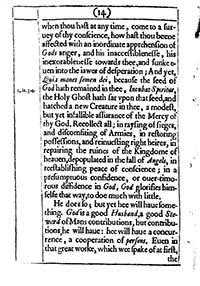
when thou hast at any time, come to a sur-
uey of thy conscience, how hast thou beene
affected with an inordinate apprehension of
Gods anger, and his inaccessiblenesse, his
inexorablenesse towards thee, and sunke e-
uen into the iawes of desperation; And yet,
Quia manet semen dei, because the seed of
God hath remained in thee, 1. Io. 3. 4. Incubat Spiritus,
the Holy Ghost hath sat vpon that seed, and
hatched a new Creature in thee, a modest,
but yet infallible assurance of the Mercy of
thy God. Recollect all; in raysing of sieges,
and discomfiting of Armies, in restoring
possessions, and reinuesting right heires, in
repairing the ruines of the Kingdome of
heauen, depopulated in the fall of Angels, in
reestablishing peace of conscience; in a
presumptuous confidence, or ouer-timo-
rous diffidence in God, God glorifies him-
selfe that way, to doe much with little. He does so; but yet hee will haue some-
thing. God is a good Husband, a good Ste-
ward of Mans contributions, but contribu-
tions he will haue: hee will haue a concu-
rrence, a cooperation of persons. Euen in
that great worke, which wee spake of at first, the 15
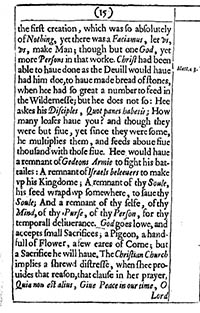
the first creation, which was so absolutely
of Nothing, yet there was a Faciamus, let vs,
vs, make Man; though but one God, yet
more Persons in that worke. Matt. 4. 3. Christ had been
able to haue done as the Deuill would haue
had him doe, to haue made bread of stones,
when hee had so great a number to feed in
the Wildernesse; but hee does not so: Hee
askes his Disciples, Quot panes habetis; How
many loafes haue you? and though they
were but fiue, yet since they were some,
he multiplies them, and feeds aboue fiue
thousand with those fiue. Hee would haue
a remnant of Gedeons Armie to fight his bat-
tailes: A remnant of Israels beleeuers to make
vp his Kingdome; A remnant of thy Soule,
his seed wrapd vp somewhere, to saue thy
Soule; And a remnant of thy selfe, of thy
Mind, of thy Purse, of thy Person, for thy
temporall deliuerance. God goes lowe, and
accepts small Sacrifices; a Pigeon, a hand-
full of Flower, a few eares of Corne; but
a Sacrifice he will haue. The Christian Church
implies a shrewd distresse, when shee pro-
uides that reason, that clause in her prayer,
Quia non est alius, Giue Peace in our time, O Lord, 16
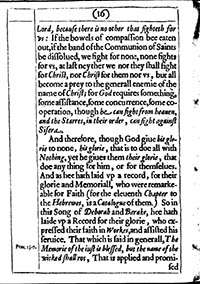
Lord, because there is no other that fighteth for
vs: If the bowels of compassion bee eaten
out, if the band of the Communion of Saints
be dissolued, we fight for none, none fights
for vs, at last neyther we nor they shall fight
for Christ, nor Christ for them nor vs, but all
become a prey to the generall enemie of the
name of Christ; for God requires something,
some assistance, some concurrence, some co-
operation, though he can fight from heauen,
and the Starres, in their order, can fight against
Sisera. And therefore, though God giue his glo-
rie to none, his glorie, that is to doe all with
Nothing, yet he giues them their glorie, that
doe any thing for him, or for themselues.
And as hee hath laid vp a record, for their
glorie and Memoriall, who were remarke-
able for Faith (for the eleuenth Chapter to
the Hebrewes, is a Catalogue of them.) So in
this Song of Deborah and Barake, hee hath
laide vp a Record for their glorie, who ex-
pressed their faith in Workes, and assisted his
seruice. That which is said in generall, The
Memorie of the iust is blessed, Prou. 13. 7. but the name of
the wicked shall rot, That is applied and promi-
sed 17
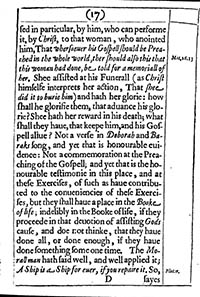 sed in particular, by him, who can
performe
sed in particular, by him, who can
performe it, by Christ, to that woman, who anointed
him, That whersoeuer his Gospell should be Prea-
ched in the whole world, Mat. 26. 13 ther should also this that
this woman had done, be told for a memoriall of
her. Shee assisted at his Funerall (as Christ
himselfe interprets her action, That shee
did it to burie him) and hath her glorie: how
shall he glorifie them, that aduance his glo-
rie? Shee hath her reward in his death; what
shall they haue, that keepe him, and his Gos-
pell aliue? Not a verse in Deborah and Ba-
raks song, and yet that is honourable eui-
dence: Not a commemoration at the Prea-
ching of the Gospell; and yet that is the ho-
nourable testimonie in this place, and at
these Exercises, of such as haue contribu-
ted to the conueniencies of these Exerci-
ses, but they shall haue a place in the Booke
of life; indelibly in the Booke of life, if they
proceede in that deuotion of assisting Gods
cause, and doe not thinke, that they haue
done all, or done enough, if they haue
done something some one time. The Mo-
rall man hath said well, and well applied it;
A Ship is a Ship for euer, if you repaire it. Plutar. So, D says 18
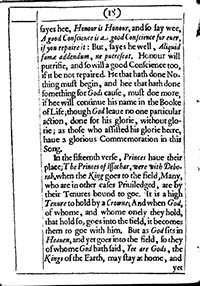
sayes hee, Honour is Honour, and so say wee,
A good Conscience is a good Conscience for euer,
if you repaire it: But, sayes he well, Aliquid
famæ addendum, ne putrescat. Honour will
putrifie, and so will a good Conscience too,
if it be not repaired. He that hath done No-
thing must begin, and hee that hath done
something for Gods cause, must doe more,
if hee will continue his name in the Booke
of Life; though God leaue no one particular
action, done for his glorie, without glo-
rie; as those who assisted his glorie heere,
haue a glorious Commemoration in this
Song. In the fifteenth verse, Princes haue their
place; The Princes of Issachar, were with Debo-
rah. when the King goes to the field, Many,
who are in other cases Priuiledged, are by
their Tenures bound to goe. It is a high
Tenure to hold by a Crowne; And when God,
of whome, and whome onely they hold,
that hold so, goes into the field, it becomes
them to goe with him. But as God sits in
Heauen, and yet goes into the field, so they
of whome God hath said, Yee are Gods, the
Kings of the Earth, may stay at home, and yet 19
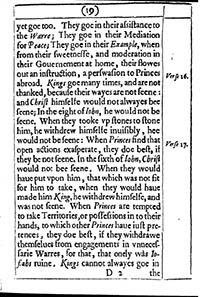
yet goe too. They goe in their assistance to
the Warre; They goe in their Mediation
for Peace; They goe in their Example, when
from their sweetnesse, and moderation in
their Gouernement at home, their flowes
out an instruction, a perswasion to Princes
abroad.Verse 16. Kings goe many times, and are not
thanked, because their wayes are not seene:
and Christ himselfe would not alwayes bee
seene; In the eight of Iohn, he would not be
seene. When they tooke vp stones to stone
him, he withdrew himselfe inuisibly, hee
would not be seene: When Princes find that
open actions exasperate, Verse 17. they doe best, if
they be not seene. In the sixth of Iohn, Christ
would not bee seene. When they would
haue put vpon him, that which was not fit
for him to take, when they would haue
made him King, he withdrew himselfe, and
was not seene. When Princes are tempted
to take Territories, or possessions in to their
hands, to which other Princes haue iust pre-
tences, they doe best, if they withdrawe
themselues from engagements in vnneces-
sarie Warres, for that, that onely was Io-
siahs ruine. Kings cannot alwayes goe in D2 the 20
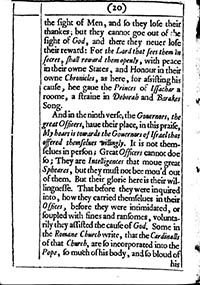
the sight of Men, and so they lose their
thankes; but they cannot goe out of the
sight of God, and there they neuer lose
their reward: For the Lord that sees them in
secret, shall reward them openly, with peace
in their owne States, and Honour in their
owne Chronicles, as here, for assisting his
cause, hee gaue the Princes of Issachar a
roome, a straine in Deborah and Barakes
Song. And in the ninth verse, the Gouernors, the
great Officers, haue their place, in this praise,
My heart is towards the Gouernors of Israel that
offered themselues willingly. It is not them-
selues in person; Great Officers cannot doe
so; They are Intelligences that moue great
Spheares, but they must not bee mou'd out
of them. But their glorie here is their wil-
lingnesse. That before they were inquired
into, how they carried themselues in their
Offices, before they were intimidated, or
soupled with fines and ransomes, volunta-
rily they assisted the cause of God. Some in
the Romane Church write, that the Cardinalls
of that Church, are so incorporated into the
Pope, so much of his body, and so bloud of his 21
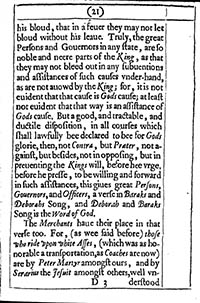
his bloud, that in a feuer they may not let
bloud without his leaue. Truly, the great
Persons and Gouernors in any state, are so
noble and neere parts of the King, as that
they may not bleed out in any subuentions
and assistances of such causes vnder-hand,
as are not auowd by the King; for, it is not
euident that that cause is Gods cause; at least
not euident that that way is an assistance of
Gods cause, But a good, and tractable, and
ductile disposition, in all courses which
shall lawfully bee declared to bee for Gods
glorie, then, not Contra, but Præter, not a-
gainst, but besides, not in opposing, but in
preuenting the Kings will, before hee vrge,
before he presse, to be willing and forward
in such assistances, this giues great Persons,
Gouernors, and Officers, a verse in Baraks and
Deborahs Song, and Deborah and Baraks
Song is the Word of God. The Merchants haue their place in that
verse too. For, (as wee said before) those
who ride vpon white Asses, (which was as ho-
norable a transportation, as Coaches are now)
are by Peter Martyr amongst ours, and by
Serarius the Iesuit amongst others, well vn-
D3 derstood 22
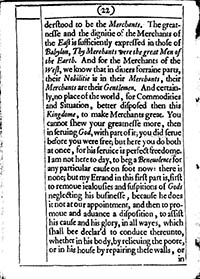 derstood to be the Merchants. The great-
derstood to be the Merchants. The great-nesse and the dignitie of the Merchants of
the East is sufficiently expressed in those of
Babylon, Thy Merchants were the great Men of
the Earth. And for the Merchants of the
West, we know that in diuers forraine parts,
their Nobilitie is in their Merchants, their
Merchants are their Gentlemen. And certain-
ly, no place of the world, for Commodities
and Situation, better disposed then this
Kingdome, to make Merchants great. You
cannot shew your greatnesse more, then
in seruing God, with part of it; you did serue
before you were free; but here you do both
at once, for his seruice is perfect freedome.
I am not here to day, to beg a Beneuolence for
any particular cause on foot now: there is
none; but my Errand in this first part is, first
to remoue iealousies and suspitions of Gods
neglecting his businesse, because he does
it not at our appointment, and then to pro-
moue and aduance a disposition, to assist
his cause and his glory, in all wayes, which
shall bee declar'd to conduce thereunto,
whether in his body, by relieuing the poore,
or in his house by repairing these walls, or in 23
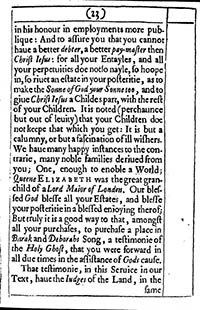
in his honour in employments more pub-
lique: And to assure you that you cannot
haue a better debter, a better pay-master then
Christ Iesus: for all your Entayles, and all
your perpetuities doe notsonot so nayle, so hoope
in, so riuet an estate in your posteritie, as to
make the Sonne of God your Sonne too, and to
giue Christ Iesus a Childes part, with the rest
of your Children. It is noted (perchaunce
but out of leuity) that your Children doe
not keepe that which you get: It is but a
calumny, or but a fascination of ill wishers.
We haue many happy instances to the con-
trarie, many noble families deriued from
you; One, enough to enoble a World;
Queene ELIZABETH was the great gran-
child of a Lord Maior of London. Our bles-
sed God blesse all your Estates, and blesse
your posteritie in a blessed enioying therof;
But truly it is a good way to that, amongst
all your purchases, to purchase a place in
Barak and Deborahs Song, a testimonie of
the Holy Ghost, that you were forward in
all due times in the assistance of Gods cause.
That testimonie, in this Seruice in our
Text, haue the Iudges of the Land, in the same 24
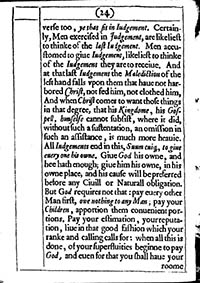
verse too, ye that sit in Iudgement. Certain-
ly, Men exercised in Judgement, are likeliest
to thinke of the last Iudgement. Men accu-
stomed to giue Iudgement, likeliest to thinke
of the Iudgement they are to receiue. And
at that last Iudgement the Malediction of the
left hand falls vpon them that haue not har-
bored Christ, not fed him, not clothed him,
And when Christ comes to want those things
in that degree, that his Kingdome, his Gos-
pell, himselfe cannot subsist, where it did,
without such a sustentation, an omission in
such an assistance, is much more heauie.
All Iudgements end in this, Suum cuique, to giue
euery one his owne. Giue God his owne, and
hee hath enough; giue him his owne, in his
owne place, and his cause will be preferred
before any Ciuill or Naturall obligation.
But God requires not that: pay euery other
Man first, owe nothing to any Man; pay your
Children, apportion them conuenient por-
tions. Pay your estimation, your reputa-
tion, liue in that good fashion which your
ranke and calling calls for: when all this is
done, of your superfluities beginne to pay
God, and euen for that you shall haue your roome 25
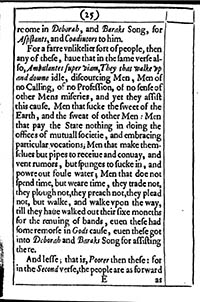
roome in Deborah, and Baraks Song, for
Assistants, and Coadiutors to him. For a farre vnlikelier sort of people, then
any of these, haue that in the same verse al-
so, Ambulantes super viam, They that walke vp
and downe idle, discourcing Men, Men of
no Calling, of no Profession, of no sense of
other Mens miseries, and yet they assist
this cause. Men that sucke the sweet of the
Earth, and the sweat of other Men: Men
that pay the State nothing in doing the
offices of mutuall societie, and embracing
particular vocations; Men that make them-
selues but pipes to receiue and conuay, and
vent rumors, but spunges to sucke in, and
powre out foule water; Men that doe not
spend time, but weare time, they trade not,
they plough not, they preach not, they plead
not, but walke, and walke vpon the way,
till they haue walked out their sixe moneths
for the renuing of bands, euen these had
some remorse in Gods cause, euen these got
into Deborah and Baraks Song for assisting
there. And lesse; that is, Poorer then these: for
in the Second verse, the people are as forward E as 26
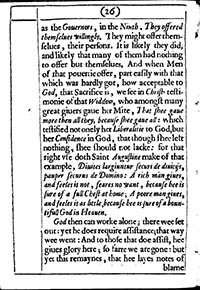 [E1v]
[E1v]
as the Gouernors, in the Ninth, They offered
themselues willingly. They might offer them-
selues, their persons. It is likely they did;
and likely that many of them had nothing
to offer but themselues. And when Men
of that pouertie offer, part easily with that
which was hardly got, how acceptable to
God, that Sacrifice is, we see in Christs testi-
monie of that Widdow, who amongst many
great giuers gaue her Mite, That shee gaue
more then all they, because shee gaue all: which
testified not onely her Liberalitie to God, but
her Confidence in God, that though shee left
nothing, shee should not lacke: for that
right vse doth Saint Augustine make of that
example, Diuites largiuntur securi de diuitijs,
pauper securus de Domino: A rich man giues,
and feeles it not, feares no want, because hee is
sure of a full Chest at home; A poore man giues,
and feeles it as little, because hee is sure of a boun-
tifull God in Heauen. God then can worke alone; there wee set
out: yet he does require assistance; that way
wee went: And to those that doe assist, hee
giues glory here; so farre we are gone: but
yet this remaynes, that hee layes notes of blame 27
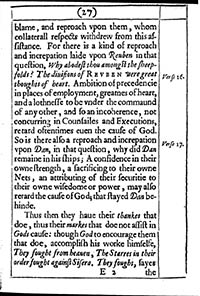
blame, and reproach vpon them, whom
collaterall respects withdrew from this as-
sistance. For there is a kind of reproach
and increpation laide vpon Reuben in that
question, Why abodest thou amongst the sheep-
folds? The diuisions of REVBEN were great
thoughts of heart. Verse 16. Ambition of precedencie
in places of employment, greatnes of heart,
and a lothnesse to be vnder the commaund
of any other, and so an incoherence, not
concurring in Counsailes and Executions,
retard oftentimes euen the cause of God.
So is there also a reproach and increpation
vpon Dan, Verse 17. in that question, why did Dan
remaine in his ships; A confidence in their
owne strength, a sacrificing to their owne
Nets, an attributing of their securitie to
their owne wisedome or power, may also
retard the cause of God; that stayed Dan be-
hinde. Thus then they haue their thankes that
doe, thus their markes that doe not assist in
Gods cause: though God to encourage them
that doe, accomplish his worke himselfe,
They fought from heauen, The Starres in their
order fought against Sisera. They fought, sayes E2 the 28
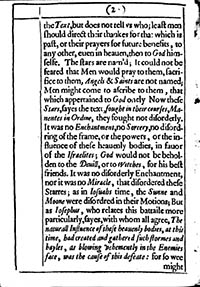
the Text, but does not tell vs who; least men
should direct their thankes for that which is
past, or their prayers for future benefits, to
any other, euen in heauen, then to God him-
selfe. The stars are nam'd; It could not be
feared that Men would pray to them, sacri-
fice to them, Angels amp; Saints are not named;
Men might come to ascribe to them, that
which appertained to God onely. Now these
Stars, sayes the text, fought in their courses, Ma-
nentes in Ordine, they fought not disorderly.
It was no Enchantment, no Sorcery, no disord-
ring of the frame, or the powers, or the in-
fluence of these heauenly bodies, in fauor
of the Israelites; God would not be behol-
den to the Deuill, or to Witches, for his best
friends. It was no disorderly Enchantment,
nor it was no Miracle, that disordered these
Starres; as in Iosuahs time, the Sunne and
Moone were disordred in their Motions; But
as Iosephus, who relates this battaile more
particularly, sayes, with whom all agree, The
naturall Influence of these heauenly bodies, at this
time, had created and gathered such stormes and
hayles, as blowing vehemently in the Enemies
face, was the cause of this defeate: for so wee might 29
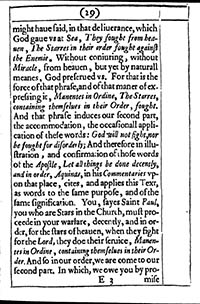
might haue said, in that deliuerance, which
God gaue vs at Sea, They fought from hea-
uen, The Starres in their order fought against
the Enemie. Without coniuring, without
Miracle, from heauen, but yet by naturall
meanes, God preserued vs. For that is the
force of that phrase, and of that maner of ex-
pressing it, Manentes in Ordine, The Starres,
containing themselues in their Order, fought.
And that phrase induces our second part,
the accommodation, the occasionall appli-
cation of these words: God will not fight, nor
be fought for disorderly; And therefore in illu-
stration, and confirmation of those words
of the Apostle, Let all things be done decently,
and in order, Aquinas, in his Commentaries vp-
on that place, cites, and applies this Text,
as words to the same purpose, and of the
same signification. You, sayes Saint Paul,
you who are Stars in the Church, must pro-
ceede in your warfare, decently, and in or-
der, for the stars of heauen, when they fight
for the Lord, they doe their seruice, Manen-
tes in Ordine, containing themselues in their Or-
der. And so in our order, we are come to our
second part. In which, we owe you by pro-
E3 mise 30
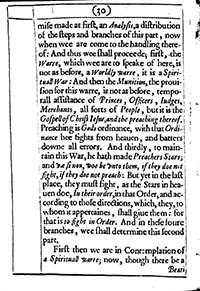
mise made at first, an Analysis, a distribution
of the steps and branches of this part, now
when wee are come to the handling there-
of: And thus wee shall proceede; first, the
Warre, which wee are to speake of here, is
not as before, a Worldly warre, it is a Spiri-
tuall War: And then the Munition, the proui-
sion for this warre, is not as before, tempo-
rall assistance of Princes, Officers, Iudges,
Merchants, all sorts of People, but it is the
Gospell of Christ Iesus, and the preaching thereof.
Preaching is Gods ordinance, with that Ordi-
nance hee fights from heauen, and batters
downe all errors. And thirdly, to main-
tain this War, he hath made Preachers Stars;
and væ si non, woe be vnto them, if they doe not
fight, if they doe not preach: But yet in the last
place, they must fight, as the Stars in hea-
uen doe, In their order, in that Order, and ac-
cording to those directions, which, they, to
whom it appertaines, shall giue them: for
that is to fight in Order. And in these foure
branches, wee shall determine this second
part. First then we are in Contemplation of
a Spirituall warre; now, though there be a Beatie 31
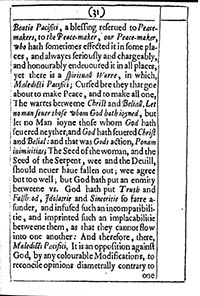
Beatie Pacifici, a blessing reserued to Peace-
makers, to the Peace-maker, our Peace-maker,
who hath sometimes effected it in some pla-
ces, and alwayes seriously and chargeably,
and honourably endeuoured it in all places,
yet there is a spirituall Warre, in which,
Maledicti Pacifici; Cursed bee they that goe
about to make Peace, and to make all one,
The warres betweene Christ and Beliall. Let
no man seuer those whom God hath ioyned, but
let no Man ioyne those whom God hath
seuered neyther; and God hath seuered Christ
and Belial: and that was Gods action, Ponam
inimicitias; The Seed of the woman, and the
Seed of the Serpent, wee and the Deuill,
should neuer haue fallen out; wee agree
but too well; but God hath put an enmity
betweene vs. God hath put Truth and
Falshood, Idolatrie and Sinceritie so farre a-
sunder, and infused such an incompatibili-
tie, and imprinted such an implacabilitie
betweene them, as that they cannot flow
into one another: And therefore, there,
Maledicti Pacifici, It is an opposition against
God, by any colourable Modifications, to
reconcile opinions diametrally contrary to one 32
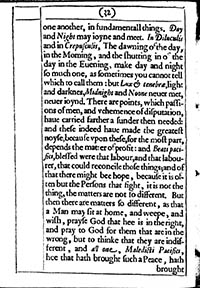
one another, in fundamentall things. Day
and Night may ioyne and meet. In Diluculis
and in Crepusculis, The dawning of the day,
in the Morning, and the shutting in of the
day in the Euening, make day and night
so much one, as sometimes you cannot tell
which to call them: but Lux amp; tenebræ, light
and darknes, Midnight and Noone neuer met,
neuer ioynd. There are points, which passi-
ons of men, and vehemence of disputation,
haue carried farther a sunder then needed:
and these indeed haue made the greatest
noyse; because vpon these, for the most part,
depends the matter of profit: and Beati paci-
fics, blessed were that labour, and that labou-
rer, that could reconcile those things; and of
that there might bee hope, because it is of-
ten but the Persons that fight, it is not the
thing, the matters are not so different. But
then there are matters so different, as that
a Man may sit at home, and weepe, and
wish, prayse God that hee is in the right,
and pray to God for them that are in the
wrong, but to thinke that they are indif-
ferent, and all one, Maledicti Pacifici,
hee that hath brought such a Peace, hath brought 33
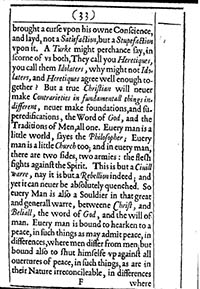
brought a curse vpon his owne Conscience,
and layd, not a Satisfaction, but a Stupefaction
vpon it. A Turke might perchance say, in
scorne of vs both, They call you Heretiques,
you call them Idolaters, why might not Ido-
laters, and Heretiques agree well enough to-
gether? But a true Christian will neuer
make Contrarieties in fundamentall things in-
different, neuer make foundations, and su-
peredifications, the Word of God, and the
Traditions of Men, all one. Euery man is a
little world, sayes the Philosopher; Euery
man is a little Church too; and in euery man,
there are two sides, two armies: the flesh
fights against the Spirit. This is but a Ciuill
warre, nay it is but a Rebellion indeed; and
yet it can neuer be absolutely quenched. So
euery Man is also a Souldier in that great
and generall warre, betweene Christ, and
Beliall, the word of God, and the will of
man. Euery man is bound to hearken to a
peace, in such things as may admit peace, in
differences, where men differ from men; but
bound also to shut himselfe vp against all
ouertures of peace, in such things, as are in
their Nature irreconcileable, in differences F where 34
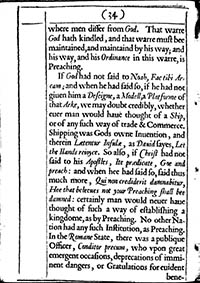
where men differ from God. That warre
God hath kindled, and that warre must bee
maintained, and maintaind by his way; and
his way, and his Ordinance in this warre, is
Preaching. If God had not said to Noah, Fac tibi Ar-
cam; and when he had said so, if he had not
giuen him a Deseigne, a Modell, a Platforme of
that Arke, we may doubt credibly, whether
euer man would haue thought of a Ship,
or of any such way of trade & Commerce.
Shipping was Gods owne Inuention, and
therein Lætentur Insulae, as Dauid sayes, Let
the Ilands reioyce. So also, if Christ had not
said to his Apostles, Ite praedicate, Goe and
preach: and when hee had said so, said thus
much more, Qui non crediderit damnabitur,
Hee that beleeues not your Preaching shall bee
damned: certainly man would neuer haue
thought of such a way of establishing a
kingdome, as by Preaching. No other Na-
tion had any such Institution, as Preaching.
In the Romane State, there was a publique
Officer, Conditor precum, who vpon great
emergent occasions, deprecations of immi-
nent dangers, or Gratulations for euident bene- 35
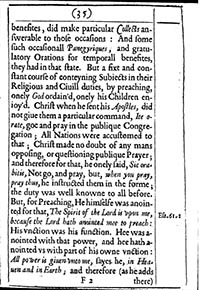
benefites, did make particular Collects an-
swerable to those occasions: And some
such occasionall Panegyriques, and gratu-
latory Orations for temporall benefites,
they had in that state. But a fixt and con-
stant course of conteyning Subiects in their
Religious and Ciuill duties, by preaching,
onely God ordain'd, onely his Children en-
ioy'd. Christ when he sent his Apostles, did
not giue them a particular command, Ite o-
rate, goe and pray in the publique Congre-
gation; All Nations were accustomed to
that; Christ made no doubt of any mans
opposing, or questioning publique Prayer;
and therefore for that, he onely said, Sic ora-
bitis, Not go, and pray, but, when you pray,
pray thus, he instructed them in the forme;
the duty was well knowne to all before.
But, for Preaching, He himselfe was anoin-
ted for that, The Spirit of the Lord is vpon me,
Esa. 61. 1 because the Lord hath anointed mee to preach:
His vnction was his function. Hee was a-
nointed with that power, and hee hath a-
nointed vs with part of his owne vnction:
All power is giuen vnto me, sayes he, in Hea-
uen and in Earth; and therefore (as he adds F2 there) 36
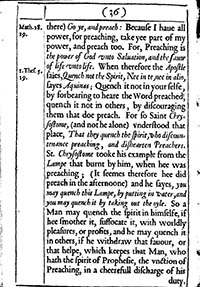
there) Go ye, Math. 28.
19. and preach: Because I haue all
power, for preaching, take yee part of my
power, and preach too. For, Preaching is
the power of God vnto Saluation, and the sauor
of life vnto life. When therefore the Apostle
saies, 1. Thes. 5.
19. Quench not the Spirit, Nec in te, nec in alio,
sayes Aquinas; Quench it not in your selfe,
by forbearing to heare the Word preached,
quench it not in others, by discouraging
them that doe preach. For so Saint Chry-
sostome, (and not he alone) vnderstood that
place, That they quench the spirit, who discoun-
tenance preaching, and dishearten Preachers.
St. Chrysostome tooke his example from the
Lampe that burnt by him, when hee was
preaching; (It seemes therefore hee did
preach in the afternoone) and he sayes, you
may quench this Lampe, by putting in water, and
you may quench it by taking out the oyle. So a
Man may quench the spirit in himselfe, if
hee smother it, suffocate it, with worldly
pleasures, or profits, and he may quench it
in others, if he withdraw that fauour, or
that helpe, which keepes that Man, who
hath the spirit of Prophesie, the vnction of
Preaching, in a cheerefull discharge of his his 37
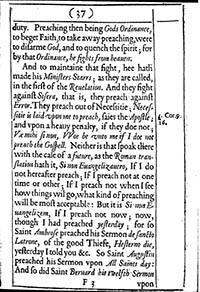
duty. Preaching then being Gods Ordinance,
to beget Faith, to take away preaching, were
to disarme God, and to quench the spirit; for
by that Ordinance, he fights from heauen. And to maintaine that fight, hee hath
made his Ministers Starrs; as they are called,
in the first of the Reuelation. And they fight
against Sisera, that is, they preach against
Error. They preach out of Necessitie; Neces-
sitie is laid vpon me to preach, 1. Cor. 9.
16. saies the Apostle;
and vpon a heauy penalty, if they doe not;
Væ mihi si non, VVoe Woe be vnto me if I doe not
preach the Gospell. Neither is that spoak there
with the case of a future, as the Roman tran-
slation hath it, Si non Euangelizauero, If I do
not hereafter preach; If I preach not at one
time or other; If I preach not when I see
how things wil go, what kind of preaching
will be most acceptable: But it is Si non E-
uangelizem, If I preach not now; now,
though I had preached yesterday; for so
Saint Ambrose preached his Sermon de sancto
Latrone, of the good Thiefe, Hesterno die,
yesterday I told you amp;c. So Saint Augustin
preached his Sermon vpon All Saints day:
And so did Saint Bernard his twelfth Sermon F3 vpon 38
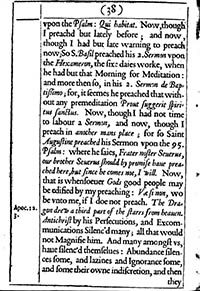
vpon the Psalm: Qui habitat. Now, though
I preachd but lately before; and now,
though I had but late warning to preach
now; So S. Basil preached his 2. Sermon vpon
the Hexameron, the sixe daies worke, when
he had but that Morning for Meditation:
and more then so, in his 2. Sermon de Bap-
tissimo; for, it seemes he preached that with-
out any premeditation Prout suggerit spiri-
tus sanctus. Now, though I had not time
to labour a Sermon, and now, though I
preach in another mans place; for so Saint
Augustine preached his Sermon vpon the 95.
Psalm: where he saies, Frater noster Seuerus,
our brother Seuerus should by promise haue prea-
ched here, but since he comes not, I will. Now,
that is whensoeuer Gods good people may
be edified by my preaching: Væ si non, wo
be vnto me, if I doe not preach. The Dra-
gon drew a third part of the starrs from heauen.
Apoc. 12.
3. Antichrist by his Persecutions, and Excom-
munications Silenc'd many; all that would
not Magnifie him. And many amongst vs,
haue silenc'd themselues: Abundance silen-
ces some, and lazines and Ignorance some,
and some their owne indiscretion, and then they 39
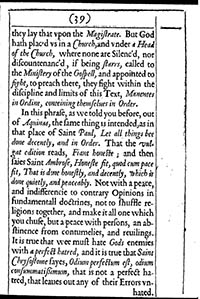
they lay that vpon the Magistrate. But God
hath plac'd vs in a Church, and vnder a Head
of the Church, where none are Silenc'd, nor
discountenanc'd, if being starrs, called to
the Ministery of the Gospell, and appointed to
fight, to preach there, they fight within the
discipline and limits of this Text, Manentes
in Ordine, conteining themselues in Order. In this phrase, as we told you before, out
of Aquinas, the same thing is intended, as in
that place of Saint Paul, Let all things bee
done decently, and in Order. That the vul-
gat edition reads, Fiant honeste; and then
saies Saint Ambrose, Honeste fit, quod cum pace
fit, That is done honestly, and decently, which is
done quietly, and peaceably. Not with a peace,
and indifferencie to contrary Opinions in
fundamentall doctrines, not to shuffle re-
ligions together, and make it all one which
you chuse, but a peace with persons, an ab-
stinence from contumelies, and reuilings.
It is true that wee must hate Gods enemies
with a perfect hatred, and it is true that Saint
Chrysostome sayes, Odium perfectum est, odium
consummatissimum, that is not a perfect ha-
tred, that leaues out any of their Errors vn-
hated. 40
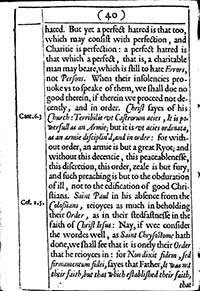
hated. But yet a perfect hatred is that too,
which may consist with perfection, and
Charitie is perfection: a perfect hatred is
that which a perfect, that is, a charitable
man may beare, which is still to hate Errors,
not Persons. When their insolencies pro-
uoke vs to speake of them, we shall doe no
good therein, if therein we proceed not de-
cently, and in order. Christ sayes of his
Church: Terribilis vt Castrorum acies, Cant. 6. 3. It is po-
werfull as an Armie; but it is vt acies ordinata,
as an armie disciplin'd, and in order: for with-
out order, an armie is but a great Ryot; and
without this decencie, this peaceablenesse,
this discretion, this order, zeale is but fury,
and such preaching is but to the obduration
of ill, not to the edification of good Chri-
stians. Saint Paul in his absence from the
Colossians, reioyces as much in beholding
their Order, Col. 2. 5. as in their stedfastnesse in the
faith of Christ Iesus: Nay, if wee consider
the wordes well, as Saint Chrysostome hath
done, we shall see that it is onely their Order
that he reioyces in: for Non dixit fidem, sed
firmamentum fidei, sayes that Father, It was not
their faith, but that which established their faith, that 41
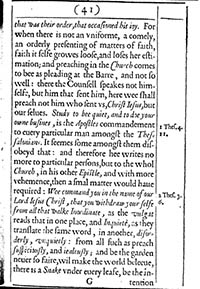
that was their order, that occasioned his ioy. For
when there is not an vniforme, a comely,
an orderly presenting of matters of faith,
faith it selfe growes loose, and loses her esti-
mation; and preaching in the Church comes
to bee as pleading at the Barre, and not so
well: there the Counsell speakes not him-
selfe, but him that sent him, here wee shall
preach not him who sent vs, Christ Iesus, but
our selues. Study to bee quiet, and to doe your
owne busines, is the Apostles commandement
to euery particular man amongst the Thes-
salonians. 1 Thes. 4.
11. It seemes some amongst them dis-
obeyd that: and therefore hee writes no
more to particular persons, but to the whol
Church, in his other Epistle, and with more
vehemence, then a smal matter would haue
required: Wee command you in the name of our
Lord Iesus Christ, 2 Thes. 3.
6. that you withdraw your selfe
from all that walke Inordinate, as the vulgat
reads that in one place, and Inquietè, as they
translate the same word, in another, disor-
derly, vnquietly: from all such as preach
suspiciously, and iealously; and be the garden
neuer so faire, wil make the world beleeue,
there is a Snake vnder euery leafe, be the in-
G tention 42
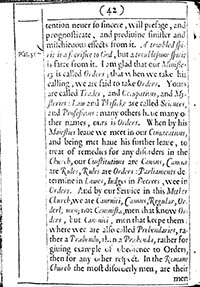 [G1v]
tention neuer so sincere,
will presage, and
[G1v]
tention neuer so sincere,
will presage, and prognosticate, and prediuine sinister and
mischieuous effects from it. A troubled spi-
rit is a sacrifice to God, Psal. 51.7 but a troublesome spirit
is farre from it. I am glad that our Ministe-
ry is called Orders; that when we take his
calling, we are said to take Orders. Yours
are called Trades, and Occupations, and My-
steries: Law and Phisicke are called Sciences,
and Professions: many others haue many o-
ther names, ours is Orders. When by his
Maiesties leaue we meet in our Conuocations,
and being met haue his further leaue, to
treat of remedies for any disorders in the
Church, our Constitutions are Canons, Canons
are Rules, Rules are Orders: Parliaments de-
termine in Lawes, Iudges in Decrees, wee in
Orders. And by our Seruice in this Mother
Church, we are Canonici, Canons, Regular, Or-
derly men; not Canonistæ, men that know Or-
ders, but Canonici, men that keepe them:
where wee are also called Prebendaries, ra-
ther a Præbendo, then a Præbenda, rather for
giuing example of obedience to Orders,
then for any other respect. In the Romane
Church the most disorderly men, are their men 43
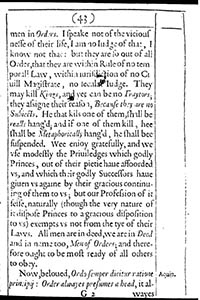
men in Orders. I speake not of the vicious
nesse of their life, I am no Iudge of that, I
know not that: but they are so out of all
Order, that they are within Rule of no tem
porall Law, within iurisdiction of no Ci
uill Magistrate, no secular Iudge. They
may kill Kings, and yet can be no Traytors;
they assigne their reason, Because they are no
Subiects. He that kils one of them, shall be
really hang'd; and if one of them kill, hee
shall be Metaphorically hang'd, he shall bee
suspended. Wee enioy gratefully, and we
vse modestly the Priuiledges which godly
Princes, out of their pietie haue affoorded
vs, and which their godly Successors haue
giuen vs againe by their gracious continu-
ing of them to vs; but our Profession of it
selfe, naturally (though the very nature of
it dispose Princes to a gracious disposition
to vs) exempts vs not from the tye of their
Laws. All men are in deed, we are in Deed
and in name too, Men of Orders; and there-
fore ought to be most ready of all others
to obey. Now, beloued, Aquin. Ordo semper dicitur ratione
principij: Order alwayes presumes a head, it al-
G2 ways 44
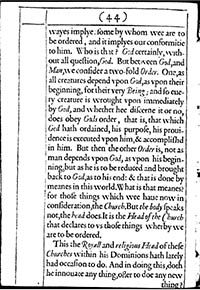 wayes
implyes some by whom wee are to
wayes
implyes some by whom wee are to be ordered, and it implyes our conformitie
to him. Who is that? God certainly, with-
out all question, God. But between God, and
Man, we consider a two-fold Order. One, as
all creatures depend vpon God, as vpon their
beginning, for their very Being; and so eue-
ry creature is wrought vpon immediately
by God, and whether hee discerne it or no,
does obey Gods order, that is, that which
God hath ordained, his purpose, his proui-
dence is executed vpon him, & accomplishd
in him. But then the other Order is, not as
man depends vpon God, as vpon his begin-
ning, but as he is to be reduced and brought
back to God, as to his end: & that is done by
meanes in this world. What is that meanes?
for those things which wee haue now in
consideration, the Church. But the body speaks
not, the head does. It is the Head of the Church
that declares to vs those things wherby we
are to be ordered. This the Royall and religious Head of these
Churches within his Dominions hath lately
had occasion to do. And in doing this, doth
he innouate any thing, offer to doe any new thing? 45
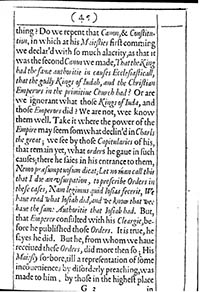
thing? Do we repent that Canon, & Constitu-
tion, in which at his Maiesties first comming
we declar'd with so much alacrity, as that it
was the second Canon we made, That the King
had the same authoritie in causes Ecclesiasticall,
that the godly Kings of Iudah, and the Christian
Emperors in the primitiue Church had? Or are
we ignorant what those Kings of Iuda, and
those Emperors did? We are not, wee know
them well. Take it where the power of the
Empire may seem somwhat declin'd in Charls
the great; we see by those Capitularies of his,
that remain yet, what orders he gaue in such
causes; there he saies in his entrance to them,
Nemo præsumptuosum dicat; Let no man call this
that I doe an vsurpation, to prescribe Orders in
these cases, Nam legimus quid Iosias fecerit, We
haue read what Iosiah did, and we know that wee
haue the same Authoritie that Iosiah had. But,
that Emperor consulted with his Cleargie, be-
fore he published those Orders. It is true, he
sayes he did. But he, from whom we haue
receiued these Orders, did more then so; His
Maiesty forbore, till a representation of some
incōueniences by disorderly preaching, was
made to him, by those in the highest place G3 in 46
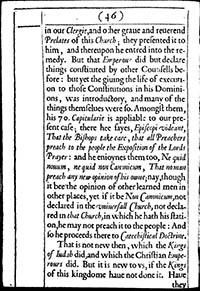
in our Clergie, and other graue and reuerend
Prelates of this Church; they presented it to
him, and thereupon he entred into the re-
medy. But that Emperour did but declare
things constituted by other Counsells be-
fore: but yet the giuing the life of executi-
on to those Constitutions in his Domini-
ons, was introductory, and many of the
things themselues were so. Amongst them,
his 70. Capitularie is appliable to our pre-
sent case; there hee sayes, Episcopi videant,
That the Bishops take care, that all Preachers
preach to the people the Exposition of the Lords
Prayer: and he enioynes them too, Ne quid
nouum, ne quid non Canonicum, That no man
preach any new opinion of his owne; nay, though
it bee the opinion of other learned men in
other places, yet if it be Non Canonicum, not
declared in the vniuersall Church, not decla-
red in that Church, in which he hath his stati-
on, he may not preach it to the people: And
so he proceeds there to Catechistical Doctrine.
That is not new then, which the Kings
of Iudah did, and which the Christian Empe-
rours did. But it is new to vs, if the Kings
of this kingdome haue not done it. Haue they 47
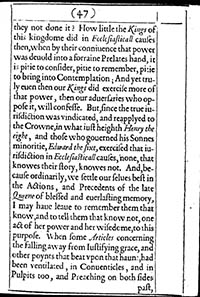
they not done it? How little the Kings of
this kingdome did in Ecclesiasticall causes
then, when by their conniuence that power
was deuold into a forraine Prelates hand, it
is pitie to consider, pitie to remember, pitie
to bring into Contemplation; And yet tru-
ly euen then our Kings did exercise more of
that power, then our aduersaries who op-
pose it, will confesse. But, since the true iu-
risdiction was vindicated, and reapplyed to
the Crowne, in what iust heighth Henry the
eight, and those who gouerned his Sonnes
minoritie, Edward the sixt, exercised that iu-
risdiction in Ecclesiasticall causes, none, that
knowes their story, knowes not. And, be-
cause ordinarily, we settle our selues best in
the Actions, and Precedents of the late
Queene of blessed and euerlasting memory,
I may haue leaue to remember them that
know, and to tell them that know not, one
act of her power and her wisedome, to this
purpose. When some Articles concerning
the falling away from Iustifying grace, and
other poynts that beat vpon that haunt, had
been ventilated, in Conuenticles, and in
Pulpits too, and Preaching on both sides past 48
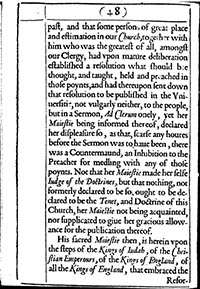
past, and that some persons of great place
and estimation in our Church, together with
him who was the greatest of all, amongst
our Clergy, had vpon mature deliberation
established a resolution what should bee
thought, and taught, held and preached in
those poynts, and had thereupon sent down
that resolution to be published in the Vni-
uersitie, not vulgarly neither, to the people,
but in a Sermon, Ad Clerum onely, yet her
Maiestie being informed thereof, declared
her displeasure so, as that, scarse any houres
before the Sermon was to haue been, there
was a Countermaund, an Inhibition to the
Preacher for medling with any of those
poynts. Not that her Maiestie made her selfe
Iudge of the Doctrines, but that nothing, not
formerly declared to be so, ought to be de-
clared to be the Tenet, and Doctrine of this
Church, her Maiestie not being acquainted,
nor supplicated to giue her gracious allow-
ance for the publication thereof. His sacred Maiestie then, is herein vpon
the steps of the Kings of Iudah, of the Chri-
stian Emperours, of the Kings of England, of
all the Kings of England, that embraced the Refor- 49
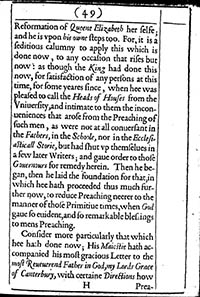
Reformation of Queene Elizabeth her selfe;
and he is vpon his owne steps too. For, it is a
seditious calumny to apply this which is
done now, to any occasion that rises but
now: as though the King had done this
now, for satisfaction of any persons at this
time, for some yeares since, when hee was
pleased to call the Heads of Houses from the
Vniuersity, and intimate to them the incon-
ueniences that arose from the Preaching of
such men, as were not at all conuersant in
the Fathers, in the Schoole, nor in the Ecclesi-
asticall Storie, but had shut vp themselues in
a few later Writers; and gaue order to those
Gouernours for remedy herein. Then he be-
gan, then he laid the foundation for that, in
which hee hath proceeded thus much fur-
ther now, to reduce Preaching neerer to the
manner of those Primitiue times, when God
gaue so euident, and so remarkable blessings
to mens Preaching. Consider more particularly that which
hee hath done now; His Maiestie hath ac-
companied his most gracious Letter to the
most Reueuerend Father in God, my Lords Grace
of Canterbury, with certaine Directions how H Prea- 50
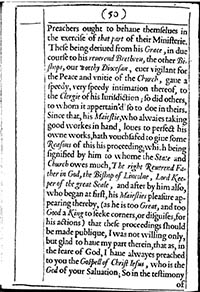
Preachers ought to behaue themselues in
the exercise of that part of their Ministerie.
These being deriued from his Grace, in due
course to his reuerend Brethren, the other Bi-
shops, our worthy Diocesan, euer vigilant for
the Peace and vnitie of the Church, gaue a
speedy, very speedy intimation thereof, to
the Clergie of his Iurisdiction; so did others,
to whom it appertain'd so to doe in theirs.
Since that, his Maiestie, who alwaies taking
good workes in hand, loues to perfect his
owne works, hath vouchsafed to giue some
Reasons of this his proceeding; which being
signified by him to whome the State and
Church owes much, The right Reuerend Fa-
ther in God, the Bishop of Lincolne, Lord Kee-
per of the great Seale, and after by him also,
who began at first, his Maiesties pleasure ap-
pearing thereby, (as he is too Great, and too
Good a King to seeke corners, or disguises, for
his actions) that these proceedings should
be made publique, I was not willing only,
but glad to haue my part therein, that as, in
the feare of God, I haue alwayes preached
to you the Gospell of Christ Iesus, who is the
God of your Saluation; So in the testimony of 51
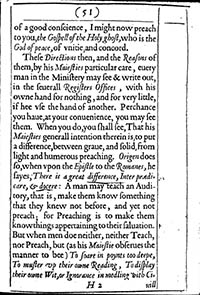
of a good conscience, I might now preach
to you, the Gospell of the Holy ghost, who is the
God of peace, of vnitie, and concord. These Directions then, and the Reasons of
them, by his Maiesties particular care, euery
man in the Ministery may see & write out,
in the seuerall Registers Offices, with his
owne hand for nothing, and for very little,
if hee vse the hand of another. Perchance
you haue, at your conuenience, you may see
them. When you do, you shall see, That his
Maiesties generall intention therein is, to put
a difference, between graue, and solid, from
light and humerous preaching. Origen does
so, when vpon the Epistle to the Romanes, he
sayes, There is a great difference, Inter prædi-
care, & docere: A man may teach an Audi-
tory, that is, make them know something
that they knew not before, and yet not
preach; for Preaching is to make them
know things appertaining to their saluation.
But when men doe neither, neither Teach,
nor Preach, but (as his Maiestie obserues the
manner to bee) To soare in poynts too deepe,
To muster vp their owne Reading, To display
their owne Wit, or Ignorance in medling with Ci-
H2 uill 52
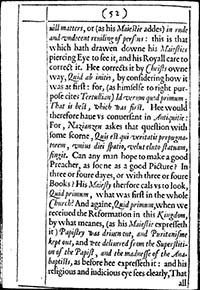 uill matters, or (as
his Maiestie addes) in rude
uill matters, or (as
his Maiestie addes) in rude
and vndecent reuiling of persons: this is that
which hath drawen downe his Maiesties
piercing Eye to see it, and his Royall care to
correct it. Hee corrects it by Christs owne
way, Quid ab initio, by considering how it
was at first: for, (as himselfe to right pur-
pose cites Tertullian) Id verum quod primum;
That is best, which was first. Hee would
therefore haue vs conuersant in Antiquitie:
For, Nazianzen askes that question with
some scorne, Quis est qui veritatis prepugna-
torem, vnius diei spatio, velut eluto statuam,
fingit. Can any man hope to make a good
Preacher, as soone as a good Picture? In
three or foure dayes, or with three or foure
Books? His Maiesty therfore cals vs to look,
Quid primum, what was first in the whole
Church? And againe, Quid primum, when we
receiued the Reformation in this Kingdom,
by what meanes, (as his Maiestie expresseth
it) Papistry was driuen out, and Puritanisme
kept out, and wee deliuered from the Superstiti-
on of the Papist, and the madnesse of the Ana-
baptists, as before hee expresseth it: and his
religious and iudicious eye sees clearly, That all 53
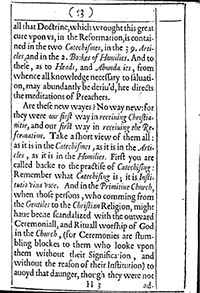
all that Doctrine, which wrought this great
cure vpon vs, in the Reformation, is contai-
ned in the two Catechismes, in the 39. Arti-
cles, and in the 2. Bookes of Homilies. And to
these, as to Heads, and Abundaies, from
whence all knowledge necessary to saluati-
on, may abundantly be deriu'd, hee directs
the meditations of Preachers. Are these new wayes? No way new: for
they were our first way in receiuing Christia-
nitie, and our first way in receiuing the Re-
formation. Take a short view of them all:
as it is in the Catechismes, as it is in the Arti-
cles, as it is in the Homilies. First you are
called backe to the practise of Catechising:
Remember what Catechising is; it is Insti-
tutio viua voce. And in the Primitiue Church,
when those persons, who comming from
the Gentiles to the Christian Religion, might
haue beene scandalized with the outward
Ceremoniall, and Rituall worship of God
in the Church, (for Ceremonies are stum-
bling blockes to them who looke vpon
them without their Signification, and
without the reason of their Institution) to
auoyd that daunger, though they were not H3 ad- 54
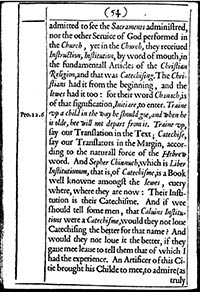
admitted to see the Sacraments administred,
nor the other Seruice of God performed in
the Church, yet in the Church, they receiued
Instruction, Institution, by word of mouth, in
the fundamentall Articles of the Christian
Religion, and that was Catechising. The Chri-
stians had it from the beginning, and the
Iewes had it too: for their word Chanach, is
of that signification, Initiare, to enter. Traine
vp a child in the way he should goe, Pro. 22. 6 and when he
is olde, hee will not depart from it. Traine vp,
say our Translation in the Text; Catechise,
say our Translators in the Margin, accor-
ding to the naturall force of the Hebrew
word. And Sepher Chinnuch, which is Liber
Institutionum, that is, of Catechisme, is a Book
well knowne amongst the Iewes, euery
where, where they are now: Their Insti-
tution is their Catechisme. And if wee
should tell some men, that Caluins Institu-
tions were a Catechisme, would they not loue
Catechising the better for that name? And
would they not loue it the better, if they
gaue mee leaue to tell them that of which I
had the experience. An Artificer of this Ci-
tie brought his Childe to mee, to admire (as truly 55
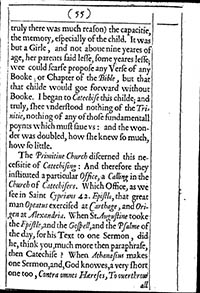
truly there was much reason) the capacitie,
the memory, especially of the child. It was
but a Girle, and not aboue nine yeares of
age, her parents said lesse, some yeares lesse;
wee could scarse propose any Verse of any
Booke, or Chapter of the Bible, but that
that childe would goe forward without
Booke. I began to Catechise this childe; and
truly, shee vnderstood nothing of the Tri-
nitie, nothing of any of those fundamentall
poynts which must saue vs: and the won-
der was doubled, how she knew so much,
how so little. The Primitiue Church discerned this ne-
cessitie of Catechising: And therefore they
instituted a particular Office, a Calling in the
Church of Catechisers. Which Office, as we
see in Saint Cyprians 42. Epistle, that great
man Optatus exercised at Carthage, and Ori-
gen at Alexandria. When St. Augustine tooke
the Epistle, and the Gospell, and the Psalme of
the day, for his Text to one Sermon, did
he, think you, much more then paraphrase,
then Catechise? When Athanasius makes
one Sermon, and, God knowes, a very short
one too, Contra omnes Hæreses, To ouerthrow all 58[56]
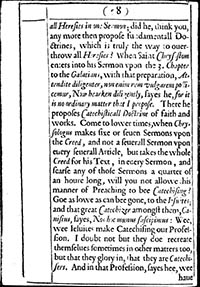
all Heresies in one Sermon; did he, think you,
any more then propose fundamentall Do-
ctrines, which is truly the way to ouer-
throw all Heresies? When Saint Chrysostom
enters into his Sermon vpon the 3. Chapter
to the Galatians, with that preparation, At-
tendite diligenter, non enim rem vulgarem polli-
cemur, Now hearken diligently, sayes he, for it
is no ordinary matter that I propose. There he
proposes Catechisticall Doctrine of faith and
works. Come to lower times, when Chry-
sologus makes sixe or seuen Sermons vpon
the Creed, and not a seuerall Sermon vpon
euery seuerall Article, but takes the whole
Creed for his Text, in euery Sermon, and
scarse any of those Sermons a quarter of
an houre long, will you not allowe this
manner of Preaching to bee Catechising?
Goe as lowe as can bee gone, to the Iesuites;
and that great Catechizer amongst them, Ca-
nisius, sayes, Nos hoc munus suscipimus: Wee,
wee Iesuites make Catechising our Profes-
sion. I doubt not but they doe recreate
themselues sometimes in other matters too,
but that they glory in, that they are Catechi-
sers. And in that Profession, sayes hee, wee haue 57
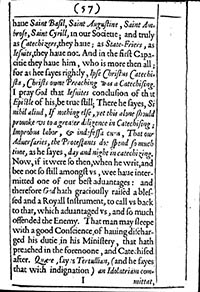
haue Saint Basil, Saint Augustine, Saint Am-
brose, Saint Cyrill, in our Societie; and truly
as Catechizers, they haue; as State-Friers, as
Iesuits, they haue not. And in the first Capa-
citie they haue him, who is more then all;
for as hee sayes rightly, Ipse Christus Catechi-
sta, Christs owne Preaching was a Catechising.
I pray God that Iesuites conclusion of that
Epistle of his, be true still; There he sayes, Si
nihil aliud, If nothing else, yet this alone should
prouoke vs to a greater diligence in Catechising;
Improbus labor, & indefessa cura, That our
Aduersaries, the Protestants doe spend so much
time, as he sayes, day and night in catechizing.
Now, if it were so then, when he writ, and
bee not so still amongst vs, wee haue inter-
mitted one of our best aduantages: and
therefore God hath graciously raised a bles-
sed and a Royall Instrument, to call vs back
to that, which aduantaged vs, and so much
offended the Enemy. That man may sleepe
with a good Conscience, of hauing dischar-
ged his dutie in his Ministery, that hath
preached in the forenoone, and Catechised
after. Quære, sayes Tertullian, (and he sayes
that with indignation) an Idolatriam com-
I mittat, 58
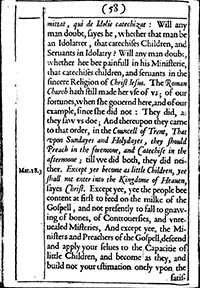 mittat, qui de Idolis
catechizat: Will any
mittat, qui de Idolis
catechizat: Will any man doubt, sayes he, whether that man be
an Idolatrer, that catechises Children, and
Seruants in Idolatry? Will any man doubt,
whether hee bee painfull in his Ministerie,
that catechises children, and seruants in the
sincere Religion of Christ Iesus. The Roman
Church hath still made her vse of vs; of our
fortunes, when she gouernd here, and of our
example, since she did not: They did, as
they saw vs doe; And thereupon they came
to that order, in the Councell of Trent, That
vpon Sundayes and Holydayes, they should
Preach in the forenoone, and Catechise in the
afternoone; till we did both, they did nei-
ther. Mat. 18. 3 Except yee become as little Children, yee
shall not enter into the Kingdome of Heauen,
sayes Christ. Except yee, yee the people bee
content at first to feed on the milke of the
Gospell, and not presently to fall to gnaw-
ing of bones, of Controuersies, and vnre-
uealed Misteries, And except yee, the Mi-
nisters and Preachers of the Gospell, descend
and apply your selues to the Capacitie of
little Children, and become as they, and
build not your estimation onely vpon the Iv satis- 59
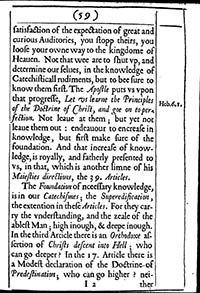
satisfaction of the expectation of great and
curious Auditories, you stopp theirs, you
loose your owne way to the kingdome of
Heauen. Not that wee are to shut vp, and
determine our selues, in the knowledge of
Catechisticall rudiments, but to bee sure to
know them first. The Apostle puts vs vpon
that progresse, Heb. 6. 1. Let vs learne the Principles
of the Doctrine of Christ, and goe on to per-
fection. Not leaue at them; but yet not
leaue them out: endeauour to encrease in
knowledge, but first make sure of the
foundation. And that increase of know-
ledge, is royally, and fatherly presented to
vs, in that, which is another limne of his
Maiesties directions, the 39. Articles. The Foundation of nceessary necessary knowledge,
is in our Catechismes; the Superedification,
the extention in these Articles. For they car-
ry the vnderstanding, and the zeale of the
ablest Man; high inough, & deepe inough.
In the third Article there is an Orthodoxe as-
sertion of Christs descent into Hell; who
can go deeper? In the 17. Article there is
a Modest declaration of the Doctrine of
Predestination; who can go higher? nei-
I2 ther 60
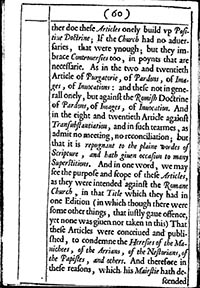 ther doe these Articles onely build vp Posi-
ther doe these Articles onely build vp Posi-tiue Doctrine; If the Church had no aduer-
saries, that were ynough; but they im-
brace Controuersies too, in poynts that are
necessarie. As in the two and twentieth
Article of Purgatorie, of Pardons, of Ima-
ges, of Inuocations: and these not in gene-
rall onely, but against the Romish Doctrine
of Pardons, of Images, of Inuocation. And
in the eight and twentieth Article against
Transubstantiation, and in such tearmes, as
admit no meeting, no reconciliation; but
that it is repugnant to the plaine wordes of
Scripture, and hath giuen occasion to many
Superstitions. And in one word, we may
see the purpose and scope of these Articles,
as they were intended against the Romane
Church, in that Title which they had in
one Edition (in which though there were
some other things, that iustly gaue offence,
yet none was giuen nor taken in this) That
these Articles were conceiued and publi-
shed, to condemne the Heresies of the Ma-
nichees, of the Arrians, of the Nestorians, of
the Papistes, and others. And therefore in
these reasons, which his Maiestie hath de-
scended 61
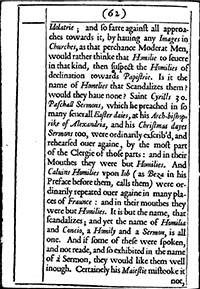 scended to giue of his Directions, himselfe
scended to giue of his Directions, himselfe is pleased to assigne this, That the people
might bee seasoned in all the Heads of the
Protestant Religion. Not onely of the
Christian against Iewes, Turkes, and Infidels,
but of the Protestant against the Romane
Church. The Foundation is in the Catechisme; the
growth and extention in the Articles, and then
the Application of all to particular Audito-
ries in the Homilies: which, if his Maie-
stie had not named, yet had beene imply-
ed in his recommendation of the Articles.
For the fiue and thirtieth Article appoynts
the reading of them: both those, which
were published in the time of Edward the
sixth, and those which after. In the first
Booke, the very first Homilies are, of the
Sufficiencie of Scriptures, and of the abso-
lute necessitie of Reading them; sufficiently
opposed against that which hath been sayd
in that Church, both of the impertinencie,
of Scriptures, as not absolutely necessarie,
and of the insufficiencie of these Scriptures,
if Scriptures were necessarie. And in the
second Booke, the second Homily is against I3 Idola 62
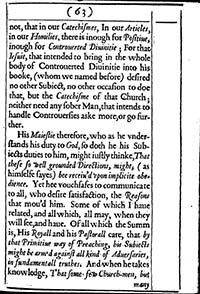
Idolatrie; and so farre against all approa-
ches towards it, by hauing any Images in
Churches, as that perchance Moderat Men,
would rather thinke that Homilie to seuere
in that kind, then suspect the Homilies of
declination towards Papistrie. Is it the
name of Homelies that Scandalizes them?
would they haue none? Saint Cyrills 30.
Paschall Sermons, which he preached in so
many seuerall Easter daies, at his Arch-bishop-
rike of Alexandria, and his Christmas dayes
Sermons too, were ordinarily exscrib'd, and
rehearsed ouer againe, by the most part
of the Clergie of those parts: and in their
Mouthes they were but Homilies. And
Caluins Homilies vpon Iob (as Beza in his
Preface before them, calls them) were or-
dinarily repeated ouer againe in many pla-
ces of Fraunce: and in their mouthes they
were but Homilies. It is but the name, that
scandalizes; and yet the name of Homilia
and Concio, a Homily and a Sermon, is all
one. And if some of these were spoken,
and not reade, and so exhibited in the name
of a Sermon, they would like them well
inough. Certainely his Maiestie mistooke it not, 63
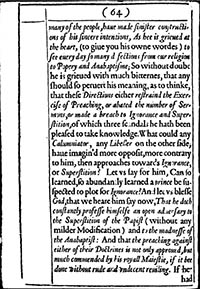 [I4]
[I4]
not, that in our Catechismes, In our Articles,
in our Homilies, there is inough for Positiue,
inough for Controuerted Diuinitie; For that
Iesuit, that intended to bring in the whole
body of Controuerted Diuinitie into his
booke, (whom we named before) desired
no other Subiect, no other occasion to doe
that, but the Catechisme of that Church;
neither need any sober Man, that intends to
handle Controuersies aske more, or go fur-
ther. His Maiestie therefore, who as he vnder-
stands his duty to God, so doth he his Sub-
iects duties to him, might iustly thinke, That
these so well grounded Directions, might, (as
himselfe sayes) bee receiu'd vpon implicite obe-
dience. Yet hee vouchsafes to communicate
to all, who desire satisfaction, the Reasons
that mou'd him. Some of which I haue
related, and all which, all may, when they
will see, and haue. Of all which the Summ
is, His Royall and his Pastorall care, that by
that Primitiue way of Preaching, his Subiects
might be arm'd against all kind of Aduersaries,
in fundamentall truthes. And when he takes
knowledge, That some few Church-men, but many 64
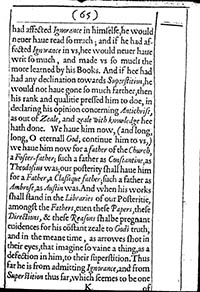
many of the people, haue made sinister constructi-
ons of his sincere intentions, As hee is grieued at
the heart, (to giue you his owne wordes) to
see euery day so many defections from our religion
to Popery and Anabaptisme; So without doubt
he is grieued with much bitternes, that any
should so peruert his meaning, as to thinke,
that these Directions either restraind the Exer-
cise of Preaching, or abated the number of Ser-
mons, or made a breach to Ignorance and Supe-
rstition, of which three scandals he hath been
pleased to take knowledge. What could any
Calumniator, any Libeller on the other side,
haue imagin'd more opposit, more contrary
to him, then approaches towards Ignorance,
or Superstition? Let vs say for him, Can so
learned, so abundantly learned a prince be su-
spected to plot for Ignorance? And let vs blesse
God, that we heare him say now, That he doth
constantly professe himselfe an open aduersary to
the Superstition of the Papist (without any
milder Modification) and to the madnesse of
the Anabaptist: And that the preaching against
either of their Doctrines is not only approued, but
much commended by his royall Maiestie, if it bee
done without rude and vndecent reuiling. If he had 65
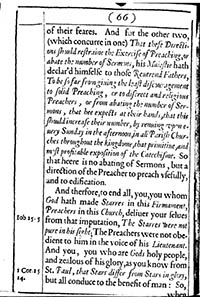
had affected Ignorance in himselfe, he would
neuer haue read so much; and if he had af-
fected Ignorance in vs, hee would neuer haue
writ so much, and made vs so much the
more learned by his Books. And if hee had
had any declination towards Superstition, he
would not haue gone so much farther, then
his rank and qualitie pressed him to doe, in
declaring his opinion concerning Antichrist,
as out of Zeale, and zeale with knowledge hee
hath done. We haue him now, (and long,
long, O eternall God, continue him to vs,)
we haue him now for a father of the Church,
a Foster-father; such a father as Constantine, as
Theodosius was; our posterity shall haue him
for a Father, a Classique father; such a father as
Ambrose, as Austin was. And when his works
shall stand in the Libraries of our Posteritie,
amongst the Fathers, euen these Papers, these
Directions, & these Reasons shalbe pregnant
euidences for his cōstant zeale to Gods truth,
and in the meane time, as arrowes shot in
their eyes, that imagine so vaine a thing, as a
defection in him, to their superstition. Thus
far he is from admitting Ignorance, and from
Superstition thus far, which seemes to be one K of 66
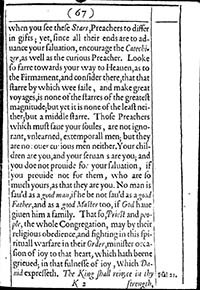
of their feares. And for the other two,
(which concurre in one) That these Directi-
ons should restraine the Exercise of Preaching, or
abate the number of Sermons, his Maiestie hath
declar'd himselfe to those Reuerend Fathers,
To be so far from giuing the least discouragement
to solid Preaching, or to discreet and religious
Preachers, or from abating the number of Ser-
mons, that hee expects at their hands, that this
should increase their number, by renuing vpon e-
uery Sunday in the afternoon, in all Parish Chur-
ches throughout the kingdome, that primitiue, and
most profitable exposition of the Catechisme. So
that heere is no abating of Sermons, but a
direction of the Preacher to preach vsefully,
and to edification. And therfore, to end all, you, you whom
God hath made Starres in this Firmament,
Preachers in this Church, deliuer your selues
from that imputation, Iob 25. 5 The Starres were not
pure in his sight; The Preachers were not obe-
dient to him in the voice of his Lieutenant.
And you, you who are Gods holy people,
and zealous of his glory, as you know from
St. Paul, 1 Cor. 15
14. that Stars differ from Stars in glory,
but all conduce to the benefit of man: So, when 67
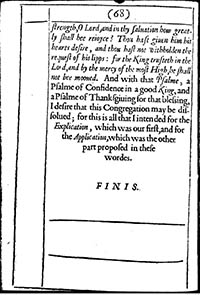
when you see these Stars, Preachers to differ
in gifts; yet, since all their ends are to ad-
uance your saluation, encourage the Catechi-
zer, as well as the curious Preacher. Looke
so farre towards your way to Heauen, as to
the Firmament, and consider there, that that
starre by which wee saile, and make great
voyages, is none of the starres of the greatest
magnitude; but yet it is none of the least nei-
ther; but a middle starre. Those Preachers
which must saue your soules, are not igno-
rant, vnlearned, extemporall men; but they
are not ouer curious men neither. Your chil-
dren are you, and your seruants are you; and
you doe not prouide for your saluation, if
you prouide not for them, who are so
much yours, as that they are you. No man is
sau'd as a good man, if he be not sau'd as a good
Father, and as a good Master too, if God
haue giuen him a family. That so, Priest and peo-
ple, the whole Congregation, may by their
religious obedience, and fighting in this spi-
rituall warfare in their Order, minister occa-
sion of ioy to that heart, which hath beene
grieued; in that fulnesse of ioy, Which Da-
uid expresseth. Psal 21. The King shall reioyce in thy K2 strength 68
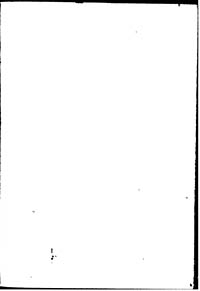
strength, O Lord, and in thy saluation how great-
ly shall hee reioyce? Thou hast giuen him his
hearts desire, and thou hast not withholden the
request of his lipps: for the King trusteth in the
Lord, and by the mercy of the most High, he shall
not bee mooued. And with that Psalme, a
Psalme of Confidence in a good King, and
a Psalme of Thanksgiuing for that blessing,
I desire that this Congregation may be dis-
solued; for this is all that I intended for the
Explication, which was our first, and for
the Application, which was the other
part proposed in these
wordes. FINIS.


 A
A
SERMON
VPON
THE VIII. VERSE
OF THE I. CHAP-
TER OF THE ACTS
OF THE APOSTLES. Preach'd
To the Honourable Company of the
VIRGINIAN PLANTATION.
13o. Nouemb. 1622. BY
IOHN DONNE Deane of St.
Pauls, London. LONDON.
Printed by A. MAT: for THOMAS IONES
and are to soldto be sold at his Shop in the Strand, at the
blacke Rauen, neere vnto Saint
Clements Church.
1622. TO THE HONORABLE
COMPANY OF THE
VIRGINIAN
Plantation. BY your fauours, I
had some place a-
mongst you, be-
fore: but now I
am an Aduentu-
rer; if not to VIRGINIA, yet
for VIRGINIA; for, euery
man, that Prints, Aduentures.
For the Preaching of this Ser-
mon, I was but vnder your In-
uitation; my Time was mine
owne, and my MedtationsMeditations mine
owne: and I had beene excusable
towards you, if I had turnd that A3 Time
Time, and those Meditations,
to GOD's seruice, in any other
place. But for the Printing of
this Sermon, I am not onely vnder
your Inuitation, but vnder your
Commandement; for, after it
was preach'd, it was not mine, but
yours,:; And therefore, if I gaue
it at first, I doe but restore it
now. The first was an act of Loue;
this, of Iustice; both which Ver-
tues, Almighty God euermore
promoue, and exalt in all your
proceedings. Amen. Your humble Seruant
in Christ Iesus
IOHN DONNE 1
 ACTS 1. 8.
ACTS 1. 8. But yee shall receiue power, after
that the Holy Ghost is come
vpon you, and yee shall be wit-
nesses vnto me both in Ierusa-
lem, and in all Iudea, and in
Samaria, and vnto the vtter-
most part of the Earth. THere are reckoned in
this booke, 22. Ser-
mons of the Apostles;
and yet the booke is
not called the Prea-
ching, but the Practise,
not the VVords Words , but
the Acts of the Apostles: and the Acts of
the Apostles were to conuay that name in 2
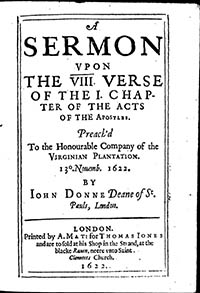
of Christ Iesus, and to propagate his
Gospell, ouer all the world: Beloued
you are Actors vpon the same Stage too:
the vttermonstvttermost part of the Earth are
your Scene: act ouer the acts of the A-
postles; bee you a light to the Gentiles,
that sit in darkenesse; be you content
to carry him ouer these Seas, who dry-
ed vp one red Sea, for his first people,
and hath powred out another red Sea,
his owne bloud, for them and vs.
When man was fallen, God clothed
him; made him a Leather Garment;
there God descended to one occupati-
on; when the time of mans redemp-
tion was come, then God, as it were, to
house him, became a Carpenters Sonne;
there God descended to another occu-
pation. Naturally, without doubt,
man would haue beene his own Tay-
lor, and his owne Carpenter; some-
thing in these two kinds man would
haue done of himselfe, though hee
had had no patterne from God: but in 3
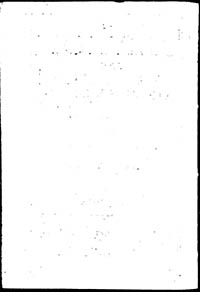
in preseruing man who was fallen, to
this redemption, by which he was to
be raisd, in preseruing man from peri-
shing, in the Flood, God descended to
a third occupation, to be his Shipwright
to giue him the modell of a Ship, an
Arke, and so to be the author of that,
which man himselfe in likelihood,
would neuer haue thought of, a means
to passe from Nation to Nation. Now,
as GOD taught vs to make cloathes,
not onely to cloath our selues, but
to cloath him in his poore and na-
ked members heere; as God taught
vs to build houses, not to house our
selues, but to house him, in erecting
Churches, to his glory: So God taught
vs to make Ships, not to transport our
selues, but to transport him, That
when wee haue receiued power, after that
the Holy Ghost is come vpon vs, we might
be witnesses vnto him, both in Ierusalem,
and in all Iudæa, and in Samaria, and
vnto the vttermost parts of the Earth. B As 4
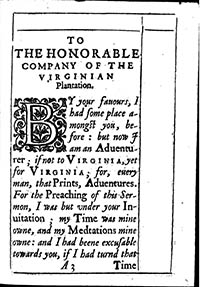 As I speake now principally to them
As I speake now principally to them who are concernd in this Plantation of
Virginia, yet there may be diuers in this
Congregation, who, though they haue
no interest in this Plantation, yet they
may haue benefit and edification, by
that which they heare me say, so Christ
spoke the words of this Text, princi-
pally to the Apostles, who were present
and questioned him at his Ascention,
but they are in their iust extention, and
due accomodation, appliable to our
present occation of meeting heere: As
Christ himselfe is Alpha, and Omega, so
first, as that hee is last too, so these
words which he spoke in the East, be-
long to vs, who are to glorifie him in
the VVest West ; That we hauing receiued pow-
er, after that the Holy Ghost is come vp-
on vs, might be witnesses vnto him, both
in Ierusalem, and in all Iudea, and in Sa-
maria, and vnto the vttermost parts of the
Earth. The first word of the Text is the Cardi- 5
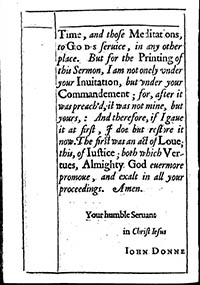
Cardinall word, the word the hinge vp-
on which the whole Text turnes; The
first word, But, is the But, that all the
rest shoots at. First it is an exclusiue
word; something the Apostles had re-
quired, which might not bee had;
not that; And it is an inclusiue word;
something Christ was pleasd to affoord
to the Apostles, which they thought not
of; not that, not that which you beat
vpon, But, but yet, something else,
something better then that, you shall
haue. That which this but, excludes,
is that which the Apostles expresse in
the Verse immediatly before the Text,
a Temporall Kingdome; VVilt Wilt thou restore
againe the kingdome of Israel? No; not
a temporall Kingdome; let not the ri-
ches and commodities of this World,
be in your contemplation in your ad-
uentures. Or, because they aske more,
VVilt Wilt thou now restore that? not yet: If
I will giue you riches, and commodi-
ties of this world, yet if I doe it not at B2 first, 6
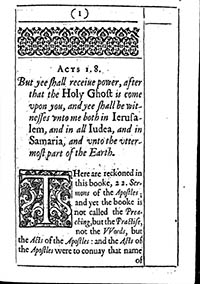
first, if I doe it not yet, be not you dis-
couraged; you shall not haue that, that
is not Gods first intention; and though
that be in Gods intention, to giue it you
hereafter, you shall not haue it yet;
thats the exclusiue part; But; there en-
ters the inclusiue, You shall receiue power,
after that the Holy Ghost is come vpon you,
and you shall bee witnesses vnto mee, both
in Ierusalem, and in all Iudæa, and in
Samaria, and vnto the vttermost parts
of the Earth. In which second part, we
shall passe by these steps; Superueniet
Spiritus, The holy Ghost shall come vpon
you, The Spirit shall witnesse to your
Spirit, and rectifie your Conscience;
And then, by that, you shall receiue
power; A new power besides the pow-
er you haue from the State, and that
power shall enable you, to be witnes-
ses of Christ, that is, to make his do-
ctrine the more credible, by your testi-
mony, when you conforme you selnesyourselues
to him, and doe as hee did; and this wit- 7
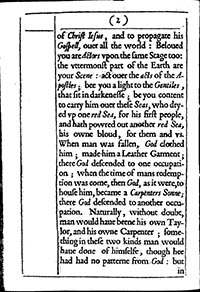
witnesse you shall beare, this confor-
mity you shall declare, first in Ierusa-
lem, in this Citie; And in Iudæa, in all
the parts of the Kingdome; and in Sa-
maria, euen amongst them who are
departed from the true worship of
God, the Papists; and to the vttermost
part of the Earth, to those poore Soules,
to whom you are continually sending.
Summarily, If from the Holy Ghost you
haue a good testimony in your owne
Conscience, you shall be witnesses for
Christ, that is, as he did, you shall giue
satisfaction to all, to the Citie, to the
Countrey, to the Calumniating Aduersary,
and the Naturals of the place, to whom
you shall present both Spirituall and
Temporall benefit to. And so you haue
the Modell of the whole frame, and of
the partitions; we proceede now to
the furnishing of the particular
roomes. B3 I. Part. 8
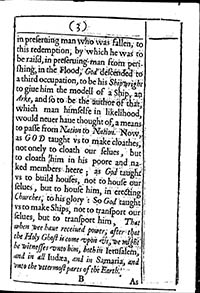 I. Part
FIrst then, this first word, But,
ex-
I. Part
FIrst then, this first word, But,
ex-cludes a temporall Kingdome; the
Apostles had filld themselues with an
expectation, with an ambition of it;
but that was not intended them. It
was no wonder, that a woman could
conceiue such an expectation, and such
an ambition, as to haue her two sonnes
sit at Christs right hand, Mat. 20. 20 and at his left,
in his Kingdome, when the Apostles
expected such a Kingdome, as might
affoord them honours and preferment
vpon Earth. More then once they
were in that disputation, in which
Christ deprehended them, Which of them
should bee the greatest in his Kingdome.
Mat. 1. 81. Neither hath the Bishop of Rome, any
thing, wherein he may so properly call
himselfe Apostolicall, as this error of the
Apostles, this their infirmitie, that he is
euermore to conuersant vpon the con-
templa- 9
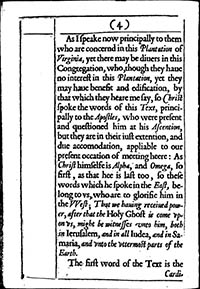 templation of temporall Kingdomes.
templation of temporall Kingdomes.
They did it all the way, when Christ
was with them, and now at his last
step, Cum actu ascendisset, Athanaz. when Christ
was not Ascending, but in part ascended,
when one foot was vpon the Earth,
and the other in the cloud that tooke
him vp, they aske him now, wilt thou
at this time, restore the Kingdome? so
women put their husbands, and men
their fathers, and friends, vpon their
torture, at their last gaspe, and make
their death-bed a racke to make them
stretch and encrease ioyntures, and por-
tions, and legacies, and signe Scedules
and Codicils, with their hand, when
his hand that presents them, is ready to
close his eyes, that should signe them:
And when they are vpon the wing for
heauen, men tye lead to their feet, and
when they are laying hand-fast vpon
Abrahams bosome, they must pull their
hand out of his bosome againe, to o-
bey importunities of men, and signe their 10
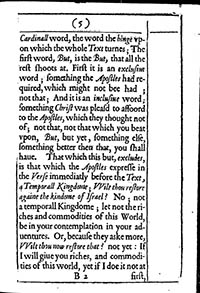
their papers: so vnderminable is the
loue of this World, which determines
euery minute. GOD, as hee is three
persons, hath three Kingdomes; There
is Regnum potentiæ, The Kingdome of
power; and this wee attribute to the
Father; it is power and prouidence:
There is Regnum gloriæ, the Kingdome
of glorie; this we attribute to the Sonn
and to his purchase; for he is the King
that shall say, Mat. 25. 34 Come ye blessed of my Fa-
ther, inherit the Kingdome prepared for
you, from the foundation of the VVorld World .
And then betweene these three is Reg-
num gratiæ, The kingdome of Grace,
and this we attribute to the Holy Ghost;
he takes them, whom the king of po-
wer, Almighty God hath rescued from
the Gentiles, and as the king of grace,
Hee giues them the knowledge of the mi-
sterie of the kingdome of GOD, Mar. 4. 11. that is,
of future glory, by sāctifying them with
his grace, in his ChnrchChurch. The two
first kingdomes are in this world, but yet 11
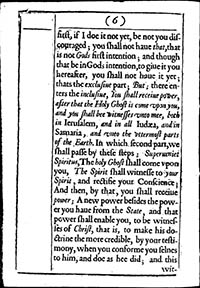
yet neither of them, are of this world;
because both they referre coto the king-
dome of glory. The kingdome of the
Father, which is the prouidence of
God, does but preserue vs; The king-
dome of the Holy Ghost which is the
grace of God, does but prepare vs to
the kingdome of the Sonne, which is
the glory of GOD; and thats in hea-
uen. And therefore, though to good
men, this world be the way to that
kingdome, yet this kingdome is not
of this world, sayes Christ himselfe:
Though the Apostles themselues, Ioh 18. 36. as
good a Schoole as they were bred in,
could neuer take out that lesson, yet
that lesson Christ giues, and repeates to
all, you seeke a Temporall kingdome,
But, sayes the Text, stop there, A king-
dome you must not haue. Beloued in him, whose kingdome,
and Ghospell you seeke to aduance, in
this Plantation, our Lord and Sauiour
Christ Iesus, if you seeke to establish a C tem- 12
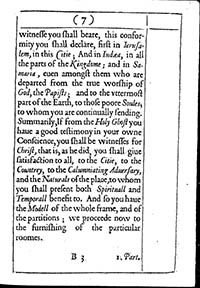
temporall kingdome there, you are not
rectified, if you seeke to bee Kings in
either acceptation of the word; To
be a King signifies Libertie and inde-
pencyinde-
pendency, and Supremacie, to bee vnder no
man, and to be a King signifies Abun-
dance, and Omnisufficiencie, to neede
no man. If those that gouerne there,
would establish such a gouernment,
as should not depend vpon this, or if
those that goe thither, propose to them-
selues an exemption from Lawes, to
liue at their libertie, this is to be Kings,
to deuest Allegeance, to bee vnder no
man: and if those that aduenture thi-
ther, propose to themselues present be-
nefit, and profit, a sodaine way to bee
rich, and an aboundance of all desira-
ble commodities from thence, this is
to be sufficient of themselues, and to
need no man: and to bee vnder no
man and to need no man, are the two
acceptations of being Kings. Whom li-
berty drawes to goe, or present profit drawers 13
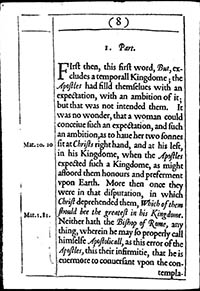
drawes to aduenture, are not yet in the
right way. O, if you could once bring
a Catechisme to bee as good ware a-
mongst them as a Bugle, as a knife, as
a hatchet: O, if you would be as rea-
dy to hearken at the returne of a Ship,
how many Indians were conuerted to
Christ Iesus, as what Trees, or druggs,
or Dyes that Ship had brought, then
you were in your right way, and not
till then; Libertie and Abundance, are
Characters of kingdomes, and a king-
dome is excluded in the Text; The A-
postles were not to looke for it, in their
employment, nor you in this your
Plantation. At least CHRIST expresses him-
selfe thus farre, in this answer, that if
he would giue them a kingdome, Non adbuc. hee
would not giue it them yet. They
aske him, VVilt Wilt thou at this time, restore
the kingdome? and hee answers, It is
not for you to know the times: what-
soeuer God will doe, Man must not C2 ap- 14
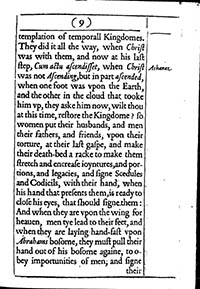
appoint him his time. The Apostles
thought of a kingdome presently after
Christs departure; the comming of
the Holy Ghost, who ledd them into
all truthes, soone deliuer'd them of that
error. Other men in fauour of the
Iewes, interpreting all the prophesies,
which are of a Spirituall kingdome, the
kingdome of the Gospell, (into which,
the Iewes shall be admitted) in a literall
sense, haue thought that the Iewes shall
haue, not onely a temporall kingdome
in the same place, in Ierusalem againe,
but because they find that kingdome
which is promised, (that is the king-
dome of the Gospell) to bee expressed
in large phrases, and in an abundant
manner, applying all that largenesse to
a temporall kingdome, they thinke,
that the Iewes shall haue such a king-
dome, as shall swallowe and annihi-
late all other kingdomes, and bee the
sole Empire and Monarchy of the world.
After this, very great men in the Church vpon 15
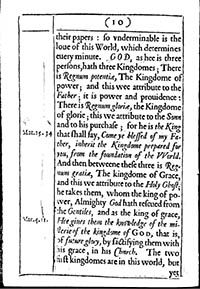
vpon these words, of One thousand
yeares after the Resurrection, haue im-
magin'd a Temporall Kingdome of the
Saints of God heere vpon Earth, Apo. 20,. be-
fore they entred the ioyes of Heauen:
and Saint Augustine himselfe, De Ciuitat.
Dei 20. 7. had at
first some declinations towards that o-
pinion, though he dispute powerfully
against it, after: That there should
bee Sabatismus in terris; that as the
world was to last Sixe thousand yeares
in troubles, there should be a Seuenth
thousand, in such ioyes as this world
could giue. And some others, who haue auoi-
ded both the Temporall kingdome ima-
gin'd by the Apostles, presently after
the Ascention, And the Emperiall king-
dome of the Iewes, before the Resurre-
ction, And the Carnall kingdome of the
Chiliasts, the Millenarians, after the
Resurrection, though they speake of no
kingdome, but the true kingdome, the
kingdome of glory, yet they erre as C3 much 16
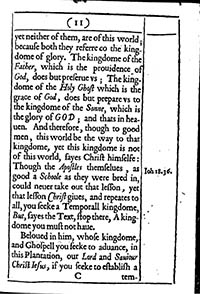
much in assigning a certaine time
when that kingdome shall beginne,
when the ende of this world, when
the Resurrection, when the Iudge-
ment shall be. Non est vestrum nosse
tempora, sayes Christ to his Apostles then;
and lest it might be thought, that they
might know these things, when the
Holy Ghost came vpon them, Christ
denies that he himselfe knew that, as
Man; and as Man, Christ knew more,
then euer the Apostles knew. What-
soeuer therefore Christ intended to his
Apostles heere, hee would not giue it
presently, non adhuc, hee would not
binde himselfe to a certaine time, Non
est vestrum nosse tempora, It belongs not
to vs to know Gods times. Beloued, vse golygodly meanes, and giue
God his leisure. You cannot beget a
Sonne, and tell the Mother, I will haue
this Sonne born within fiue Moneths;
nor, when he is borne, say, you will
haue him past daunger of VVardship Wardship with- 17
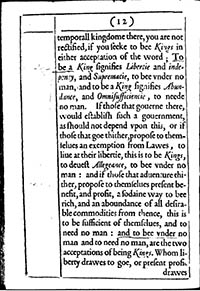
within fiue yeares. You cannot sow
your Corne to day, and say it shall
bee aboue ground to morrow, and
in my Barne next weeke. Howe
soone the best Husbandman, sow'd
the best Seede, in the best
ground? GOD cast the promise of
a Messias, as the seede of all, in Para-
dise; In Semine Mulieris; The Seed of
the Woman shall bruise the Serpents head;
and yet this Plant was Foure thousand
yeares after before it appeared; this
Messias Foure thousand yeares before
he came. GOD shew'd the ground
where that should growe, Two thou-
sand yeares after the Promise; in Abra-
hams Family; In semine tuo, In thy Seed
all Nations shall be blessed. God hedgd
in this Ground almost One thousand
yeares after that; In Micheas time, Et
tu Bethlem, Thou Bethlem shalt bee the
place; and God watered that, and wee-
ded that, refreshed that dry expectati-
on, with a Succession of Prophets; and yet 18
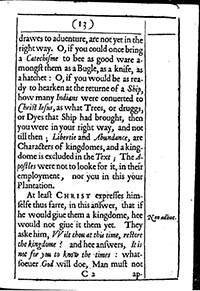
yet it was so long before this expecta-
tion of Nations, this Messias came. So
GOD promised the Iewes a Kingdome,
in Iacobs Prophecie to Iuda, Gen. 49. That the
Scepter should not depart from his Tribe.
In Two hundred yeares more, he saies
no more of it; Deu. 17. 14. then he ordaines some
institutions for their King, when they
should haue one. And then it was
Foure hundred yeares after that, before
they had a King. GOD ment from
the first howre, to people the whole
earth; and God could haue made men
of clay, as fast as they made Brickes
of Clay in Egypt; but he began vpon
two, and when they had beene mul-
plyingmulti-
plying and replenishing the Earth One
thousand sixe hundred yeares, the
Flood washed all that away, and GOD
was almost to begin againe vpon eight
persons; and they haue seru'd to peo-
ple Earth and Heauen too; Bee not
you discouraged, if the Promises
which you haue made to your selues, or 19
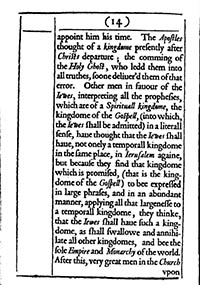
or to others, be not so soone discharg'd;
though you see not your money,
though you see not your men, though
a Flood, a Flood of bloud haue broken in
vpon them, be not discouraged. Great
Creatures ly long in the wombe; Ly-
ons are litterd perfit, but Bearewhelps
lick'd vnto their shape; actions which
Kings vndertake, are cast in a mould;
they haue their perfection quickly; a-
ctions of priuate men, and priuate pur-
ses, require more hammering, and
more filing to their perfection. Onely
let your principall ende, bee the pro-
pagation of the glorious Gospell, and
though there bee an Exclusiue in the
Text, GOD does not promise you a
Kingdome, ease, and abundance in all
things, and that which he does intend
to you, he does not promise presently,
yet there is an IuclusineInclusiue too; not that,
But, but something equiuolent at least,
But yee shall receiue power, after that the
Holy Ghost is come vpon you, and yee shall D be 20
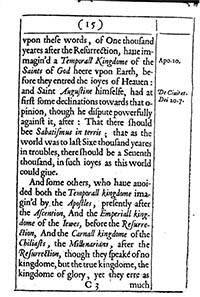
be witnesses vnto me, both in Ierusalem,
and in all Iudæa, and in Samaria, and
vnto the vttermost parts of the Earth. 2. Part. NOow our Sauiour Christ does not
say to these men, since you are so
importunate you shall haue no King-
dome; now nor neuer; Sed. tis, not yet? But,
he does not say, you shall haue no king-
dome, nor any thing else; tis not that; But;
the importunitie of beggers, some-
times drawes vs to such a froward an-
swer, for this importunitie, I will ne-
uer giue you any thing. Our patterne
was not so froward; 1 Sam. 16 hee gaue them
not that, but as good as that. Samuel
was sent to superinduct a King vpon
Saul, to annoint a new King. Hee
thought his Commission had bene deter-
mined in Eliab, Surely this is the Lords
Annointed. But the Lord said, not he; nor 21
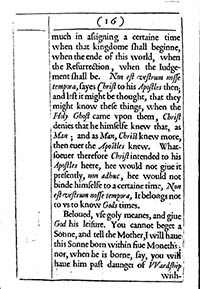
nor the next, Aminadab; nor the next, Shā-
mah; nor none of the next seuen; But;
but yet there is one in the field, keeping
sheepe, annoint him; Dauid is he. Saint
Paul prayed earnestly, and frequently,
to be discharged of that Stimulus Carnis:
God saies no; not that; but Gratia mea
sufficit, Thou shalt haue grace to ouer-
come the tentation, though the tenta-
tion remaine. God sayes to you, No
Kingdome, not ease, not abundance; nay
nothing at all yet; the Plantation shall
not discharge the Charges, not defray
it selfe yet; but yet already, now at
first, it shall conduce to great vses; It
shall redeeme many a wretch from the
Iawes of death, from the hands of the
Executioner, vpon whom, perchauuceperchaunce
a small fault, or perchance a first fault,
or perchance a fault heartily and sin-
cerely repented, perchance no fault, but
malice, had otherwise cast a present,
and ignominious death. It shall sweep
your streets, and wash your dores, from D2 idle 22
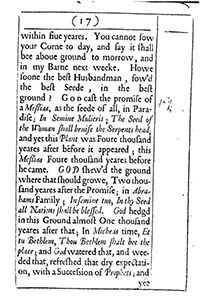
idle persons, and the children of idle
persons, and imploy them: and truely,
if the whole Countrey were but such
a Bridewell, to force idle persons to
work, it had a good vse. But it is alrea-
dy, not onely a Spleene, to draine the
ill humors of the body, but a Liuer, to
breed good bloud; already the im-
ployment breeds Marriners; already
the place giues essayes, nay Fraytes of
Marchantable commodities; already
it is a marke for the Enuy, and for the
ambition of our Enemies; I speake but
of our Doctrinall, not Nationall Ene-
mies; as they are Papists, they are sory
we haue this Countrey; and surely,
twenty Lectures in matter of Contro-
uersie, doe not so much vexe them, as
one Ship that goes, & strengthens that
Plantation. Neither can I recom-
mend it to you, by any better Retorique
then their malice. They would gladly
haue it, and therefore let vs bee glad to
hold it. Thus 23
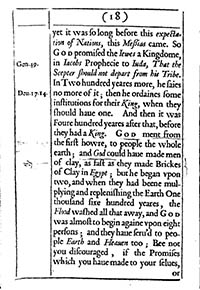 Thus then this Text proceedes, Spiritus
Thus then this Text proceedes, Spiritus
Sanctus. and
gathers vpon you. All that you would
haue by this Plantation, you shall not
haue; GOD bindes not himselfe to
measures; All that you shall haue, you
haue not yet; GOD bindes not him-
selfe to times, but something you shall
haue; nay, you haue already, some
great things; and of those that in the
Text is, The Holy Ghost shall come vp-
on you. weWe find the Holy Ghost to haue
come vpon men, foure times in this
Booke. First, Acts 2, 1. vpon the Apostles at
Pentecost. Then, when the whole
Congregation was in prayer for the
imprisonment of Peter and Iohn. 4. 31. A-
gaine, when Peter preached in Cornelius
his house, 10. 44. the Holy Ghost fell vpon all
them that heard him. And fourthly,
when Saint Paul laid his hands vpon
them, who had beene formerly bap-
tized at Ephesus. 19. 6. At the three latter
times, it is euident that the Holy Ghost
fell vpon whole and promiscuous Con- 24
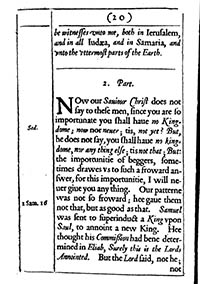
Congregations, and not vpon the Apo-
stles onely: and in the first, at Pente-
cost, the contrary is not euident; nay,
the Fathers, for the most part, that han-
dle that, concurre in that, that the Ho-
ly Ghost fell then vpon the whole Con-
gregation, men and women. The
Holy Ghost fell vpon Peter before hee
preach'd, and it fell vpon the hearers
when he preach'd, and it hath fallen
vpon euery one of them, who haue
found motions in themselnesthemselues, to pro-
pagate the Gospell of Christ Iesus by this
meanes. The Sonne of GOD did not
abhorre the Virgins wombe, when hee
would be made man; when he was
man, he did not disdaine to ride vpon
an Asse into Ierusalem: the third person
of the Trinity, the Holy Ghost is as hum-
ble as the second, hee refuses Nullum
vehiculum, no conueyance, no doore
of entrance into you; whether the
example and precedent of other good
men, or a probable imagination of fu-
ture 25
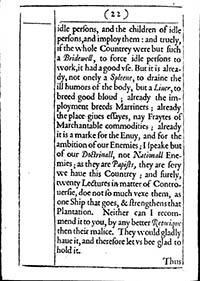 ture
profit, or a willingnes to concurre
ture
profit, or a willingnes to concurre to the vexation of the Enemie, what
collaterall respect soeuer drew thee in,
if now thou art in, thy principall re-
spect be the glory of God, that occasi-
on, whatsoeur it was, was vehiculum
Spiritus Sancti, that was the Petard,
that broke open thy Iron gate, that
was the Chariot, by which he entred
into thee, and now hee is fallen vpon
thee, if thou do not Depose, (lay aside all
consideration of profit for euer, neuer
to looke for returne) No not Sepose,
(leaue out the consideration of profit
for a time) (for that, and Religion
may well consist together,) but if thou
doe but Post-pose the consideration of
temporall gaine, and study first the ad-
uancement of the Gospell of Christ Ie-
sus, the Holy Ghost is fallen vpon you,
for by that, you receiue power, sayes the
Text. There is a Power rooted in Na-
ture, Potestatem. and a Power rooted in Grace; a power 26
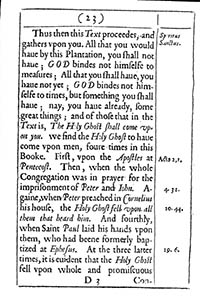
power yssuing from the Law of Na-
tions, and a power growing out of the
Gospell. In the Law of Nature and
Nations, A Land neuer inhabited, by
any, or vtterly derelicted and imme-
morially abandoned by the former In-
habitants, becomes theirs that wil pos-
sesse it. So also is it, if the inhabitants
doe not in some measure fill the Land,
so as the Land may bring foorth her in-
crease for the vse of men: for as a man
does not become proprietary of the
Sea, because hee hath two or three
Boats, fishing in it, so neither does a
aman become Lord of a maine Con-
tinent, because hee hath two or three
Cottages in the Skirts thereof. That
rule which passes through all Municipal
Lawes in particular States, Interest rei-
publicæ vt quis re sua bene vtatur, The
State must take order, that euery man im-
prooue that which he hath, for the best ad-
uantage of that State, passes also through
the Law of Nations, which is to all the 27
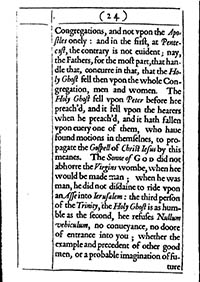
the world, as the Municipall Law is to a
particular State, Interest mundo, The
whole world, all Mankinde must take care,
that all places be emprou'd, as farre as may
be, to the best aduantage of Mankinde in
generall. Againe if the Land be peo-
pled, and cultiuated by the people, and
that Land produce in abundance such
things, for want whereof their negh-
bours, or others (being not enemies)
perish, the Law of Nations may iusti-
fie some force;, in seeking, by permu-
tation of other commodities which
they neede, to come to some of theirs.
Many cases may be put, when not one-
ly Comerce, and Trade, but Plantations
in lands, not formerly, our owne, may
be lawfull. And for that, Accepistis po-
testatem, you haue your Commission,
your Patents, your Charters, your Seales
from him, vpon whose acts, any pri-
uate Subiect, in Ciuill matters, may
safely rely. But then, Accipietis potesta-
tem, You shall receiue power, sayes the text; E you 28
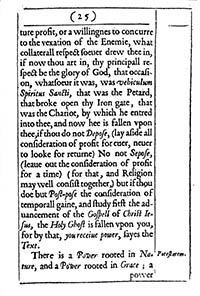
you shall, when the Holy Ghost is come
vpon you; that is, when the instinct,
the influence, the motions of the Holy
Ghost enables your Conscience to say,
that your principall ende is not gaine,
nor glory, but to gaine Soules to the
glory of GOD, this Seales the great
Seale, this iustifies Iustice it selfe, this
authorises Authoritie, and giues power
to strength it selfe. Let the Conscience
bee vpright, and then Seales, and Pa-
tents, and Commissions are wings; they
assist him to flye the faster; let the
Conscience be lame, and distorted, and
he that goes vpon Seales, and Patents,
and Commissions, goes vpon weake and
feeble crouches. When the Holy Ghost
is come vpon you, your Conscience
rectified, you shall haue Power, a new
power out of that; what to doe?
that followes, to bee witnesses vnto
Christ. Infamy is one of the highest punish-
ments that the Law inflicts vpon man; Testes. for 29
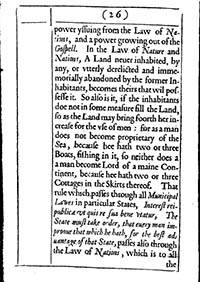
for it lyes vpon him euen after death:
Infamy is the worst punishment, and
Intestabilitie, (to be made intestable) is
one of the deepest wounds of infamy;
and then the worst degree of intestabi-
litie, is not to bee
beleeued, not to bee admitted to be a witnesse of any o-
ther: he is Intestable that cannot make
a Testament, not giue his owne goods;
and hee Intestable that can receiue no-
thing by the Testament of another; hee
is Intestable, in whose behalfe no testi-
mony may be accepted; but he is the
most miserably Intestable of all, the
most detestably intestable, that discre-
dits another man by speaking well of
him, and makes him the more suspi-
tious, by his commendations. A
Christian in profession, that is not a
Christian in life, is so intestable so, hee
discredits Christ, and hardens others a-
gainst him. Iohn Baptist was more
then a Prophet, because he was a Wit-
nesse of Christ; and he was a Witnesse, E2 because 30
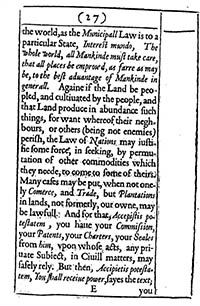
becauebecause hee was like him, he did as hee
did, he lead a holy and a religious life;
so he was a Witnesse. That great and
glorious name of Martyr, is but a Wit-
nesse. Saint Stephen was Proto-martyr,
Christs first VVitnesse Witnesse , because hee was
the first that did as he did, that put on
his colours, that drunke of his Cup,
that was baptised with his Baptisme,
with his owne bloud: so hee was a
VVitnesse Witnesse . To be Witnesses for Christ,
is to be like Christ; to conforme your
selues to Christ; and they in the Text, &
you, are to be witnesses of Christ in Ieru-
salem, and in all Iudæa, and in Samaria,
and vnto the vttermost parts of the Earth. Saint Hierome notes that Iohn Bap-
tist was not bid to beare witnesse in
Ierusalem, Ierusalem. in the Citie, but in the Wil-
dernesse; he, and none but he: there
were but few men to witnes to there;
& those few that were, came thither
with a good disposition to be wrought
vpon there; and there there were fewe 31
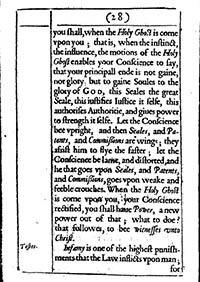
fewe witnesses to oppose Iohns Testi-
mony, few tentations, few worldly al-
luremēts, few worldly businesses. One
was enough for the Wildernesse; but for
Ierusalem, for the Citie, where all the ex-
cuses in the Gospell doe alwaies meete,
they haue bought commodities, and
they must vtter them, they haue pur-
chased Lands, & they must state them,
they haue maried Wiues, and they
must study them, to the Citie, to Ie-
rusalem, Christ sends all his Apostles,
and all little inough. Hee hath sent a
great many Apostles, Preachers, to this
Citie; more then to any other, that I
know. Religious persons as they call
them, Cloistered Friars are not sent to
the Citie; by their first Canons, they
should not preach abroad: but for those
who are to doe that seruice, there are
more in this Citie, then in others, for
there are more Parish Churches heere
then in others. Now, beloued, if in this
Citie, you haue taken away a great part E3 of 32
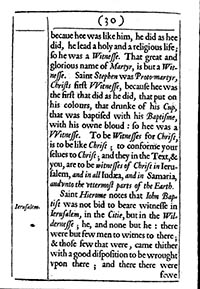
of the reuenue of the Preacher, to your
selues, take thus much of his labour
vpon your selues to, as to preach to one
another by a holy and exemplar life,
and a religious conuersation. Let those
of the Citie, who haue interest in the
Gouernment of this Plantation, be Wit-
nesses of Christ who is Truth it selfe, to
all other Gouernours of Companies, in all
true and iust proceedings: that as
CHRIST said to them who thought
themselues greatest, Except you become
as this little Childe, so we may say to the
Gouenours of the grearestgreatest Companies,
Except you proceed with the integrity,
with the iustice, with the clearenesse,
of your little Sister, this Plantation, you
doe not take, you doe not follow a
good example. This is to beare wit-
nesse of Christ in Ierusalem, in the Citie,
to bee examples of Truth, and Iustice,
and Clearenesse, to others, in, and of
this Citie. The Apostles were to do this in Iudæa Judæa. too, 33
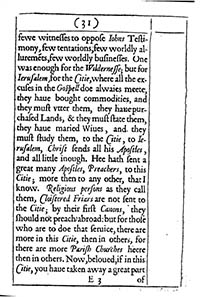
too, their seruice lay in the Countrey as
well as in the Citie. Birds that are kept
in cages may learne some Notes, which
they should neuer haue sung in the
Woods or Fields; but yet they may
forget their naturall Notes too. Prea-
chers that binde themselues alwaies to
Cities and Courts, and great Auditories,
may learne new Notes; they may be-
come occasionall Preachers, and make
the emergent affaires of the time, their
Text, and the humors of the hearers
their Bible; but they may loose their
Naturall Notes, both the simplicitie, and
the boldnesse that belongs to the Prea-
ching of the Gospell: both their pow-
er vpon lowe vnderstandings to raise
them, and vpon high affection to hum-
ble them. They may thinke that their
errand is but to knocke at the doore, to
delight the eare, and not to search the
House, to ransacke the conscience.
Christ left the Ninteie and nine for one
Sheepe; populous Cities are for the most 34
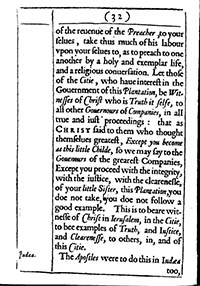
most part best prouided; remoter parts
need our labour more, and we should
not make such differences. Yeoman, and
Labourer, and Spinster, are distinctions
vpon Earth; in the Earth, in the graue
there is no distinction. The Angell that
shall call vs out of that dust, will not
stand to suruay, who lyes naked, who
in a Coffin, who in Wood, who in
Lead, who in a fine, who in a courser
Sheet; In that one day of the Resur-
rection, there is not a forenoone for
Lords to rise first, and an afternoone
for meaner persons to rise after. Christ
was not whip'd to saue Beggars, and
crown'd with Thornes to saue Kings:
he dyed, he suffered all, for all; and we
whose bearing witnesse of him, is to
doe, as hee did, must conferre our la-
bours vpon all, vpon Ierusalem, and vp-
on Iudæa too, vpon the Citie, and vp-
on the Country too. You, who are
his witnesses too, must doe so too;
preach in your iust actions, as to the Citie 35
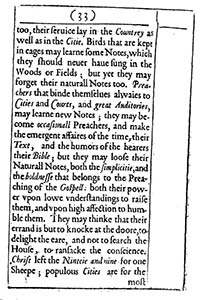
Citie, to the Countrey too. Not to
Seale vp the secrets, and the misteries of
your businesse within the bosome of
Merchants, and exclude all others who
nourish an incompatibility betweene
Merchants & Gentlemen; that Merchants
shall say to them in reproach, you
haue plaid the Gentlemen, and they in
equall reproach, you haue playd the
Merchant; but as Merchants growe vp
into worshipfull Families, and wor-
shipfull Families let fall branches a-
mongst Merchants againe, so for
this particular Plantation, you may
consider Citie and Countrey to bee one
body, and as you giue example of a iust
gouernment to other companies in the
Citie, (thats your bearing witnesse in
Ierusalem,) so you may be content to
giue reasons of your proceedings, and
account of moneyes leuied, ouer the
Countrey, for thats your bearing witnes
in Iudæa. F But 36
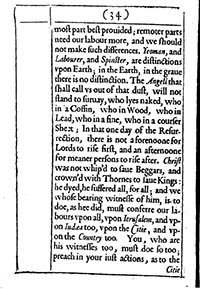 But the Apostles Dioces is enlarged,
But the Apostles Dioces is enlarged,
Samaria. farther then Ierusalem, farther thethen Iu-
dæa, they are carried into Samaria; you
must beare witnesse of me in Samaria. Be-
loued, when I haue remembred you,
who the Samaritans were, Men that
had not renounced GOD, but mingled
other Gods with him, Men that had
not burnt the Law of GOD, but made
Traditions of Men equall to it, you
will easily guesse to whom I apply the
name of Samaritans now. A Iesuit hath
told vs (an ill Intelligencer I confesse,
but euen his Intelligencer, the Deuill
himselfe, sayes true sometimes) Maldo-
nate sayes, the Samaritans were odious
to the Iewes, vpon the same grounds as
Heretiques and Scismatiques to vs; and
they, we know were odious to them
for mingling false Gods, and false wor-
ships with the true. And if that be the
Caracter of a Samaritan, wee knowe
who are the Samaritans, who the He-
retiques, who the Scismatiques of our times, 37
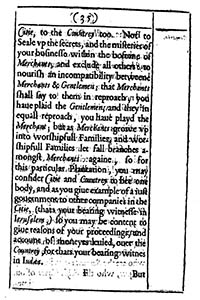
times. In the highest reproach to
Christ, the Iewes said, Samaritanus es
& Dæmonium habes, Thou art a Samar-
itan & hast a Deuill. In our iust detestati-
on of these Men, we iustly fasten both
those vpon them. For as they delight in
lyes and fill the world with weekely
rumors, Dæmonium habēt, they haue a De-
uill, quia mendax est & pater eius. Iohn 8. 44. As they
multiply assassinats vpon Princes, and
Massacres vpon people, Dæmonium h-
abent, they haue a Deuill, quia homicida
ab initio: as they tosse, and tumble, and
dispose kingdomes, Daemonium habent,
they haue a Deuill, Omina haec dabo was
the Deuils complement: Mat. 4. 10. but as they
mingle truthes and falshoods together
in Religion, as they carry the word of
GOD, and the Traditions of Men, in
an euen balance, Samaritani sunt, they
are Samaritanes. At first Christ forbad
his Apostles, to goe into any Citie of the
Samaritans: 10. 5. after, they did preach in
many of them. Beare witnesse first in F2 Ie- 38
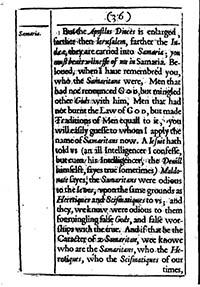
Ierusalē; Acts 8. 25. & in Iudaea; giue good satisfacti-
on especially to those of the houshold
of the faithfull, in the Citie & Countrey,
but yet satisfie euē those Samaritans too. They would be satisfied, what Mira-
cles you work in Virginia; & what peo-
ple you haue conuerted to the Christian
Faith, there. If we could as easily cal na-
turall effects Miracles, or casuall acci-
dents miracles, or Magical illusions, mi-
racles, as they do, to make a miraculous
drawing of a tooth, a miraculous cut-
ting of a corn, or, as Iustus Baronius saies,
when he was conuerted to them; that
he was miraculously cur'd of the Cho-
lique, by stooping to kisse the Popes foot,
If we would pile vp Miracles so fast, as
Pope Iohn 22. did in the Canonization
of Aquinas, Tot Miracula confecit, quot de-
terminauit questiones, he wrought as ma-
ny miracles, as he resolu'd questions, we
might find Miracles too. In truth, their
greatest Miracle to me, is, that they find
men to beleeue their miracles. If they rely 39
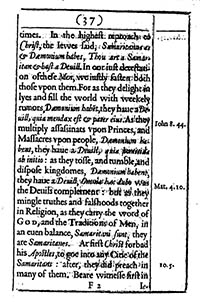
rely vpon miracles, they imply a confes-
sion that they induce new doctrines;
that that is old & receiu'd, needs no mi-
racles; If they require miracles, because,
though that be ancient Doctrine, it is
newly broght into those parts, we haue
the confession of their Iesuit, Acosta, that
they doe no miracle in those Indies, and
he assignes very good reasons, why they
are not necessary, nor to bee expected
there. But yet, yet beare witnesse to
these Samaritans, in the other point; la-
bour to giue them satisfaction in the
other point of their chardge, What
Heathens you haue conuerted to the
Faith, which is that which is intended
in the next, which is the last branch,
You are to be witnesses vnto me both in Ieru-
salem, & in all Iudaea, & in Samaria, and
vnto the vttermost parts of the Earth. Litterally, Fines terra. the Apostles were to bee
such witnesses for Christ: were they
so? did the Apostles in person, preach
the Gospell, ouer all the World? I know F3 that 40
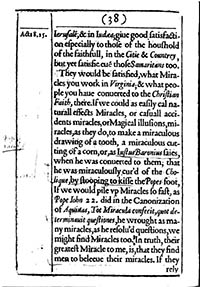
that it is not hard to multiply places of
the Fathers, in confirmation of that o-
pinion, that the Apostles did actually,
and personally preach the Gospell in all
Nations, in their life. Christ saies, the
Gospell of the Kingdome shall be preach'd
Mat. 24.14 in all the World; and there hee tels the
Apostles, that they shall see something
done, after that; Therefore they shall
liue to it. So he saies to them, You shal be brought before Rulers and Kings for my
sake; Mark. 13. 9. but the Gospell must first be pub-
lished among all Nations: In one E-
uangelist there is the Commission; Preach
in my name to all Nations. Luk 24. 47 And in ano-
ther, the Execution of this Commission,
And they went and preach'd euery where.
Mar. 16. 20 And after the Apostle certifies, and re-
turnes the execution of this Commissi-
on, The Gospell is come and bringeth forth
fruit to all the world: Col. 1. 5. and vpon those,
and such places, haue some of the Fa-
thers beene pleasd, to ground their lite-
rall exposition, of an actuall and per-
sonall 41
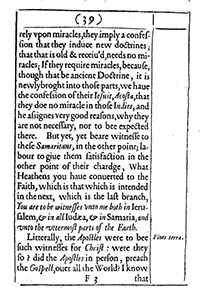 sonall preaching
of the Apostles ouer
sonall preaching
of the Apostles ouer all the world. But had they dream'd of
this world which hath been discouer'd
since, into which, wee dispute with
perplexitie, and intricacy enough,
how any men came at first, or how
any beastes, especially such beastes
as men were not likely to carry,
they would neuer haue doubted to
haue admitted a Figure, in that, Luc. 1. 1. The
Gospell was preached to all the world; for
when Augustus his Decree went out,
That all the World should bee taxed, the
Decree and the Taxe went not certain-
ly into the West Indies; when Saint
Paul sayes, Rom. 1. 8. That their Faith was spoken
of throughout the whole world, 16. 19. and that
their obedience was come abroad vnto all
men, surely the West Indies had not
heard of the faith and the obedience of
the Romanes. But as in Moses time, they
call'd the Mediterranean Sea, the great
Sea, because it was the greatest that
those men had then seene, so in the A-
postles 42
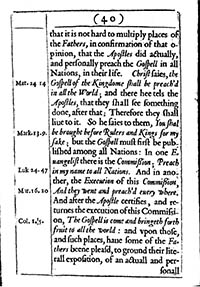 [F4v]
postles time, they call'd that all the
[F4v]
postles time, they call'd that all the
world, which was knowne and tra-
ded in then; and in all that, they
preach'd the Gospell. So that as Christ
when he said to the Apostles; Mar. vlt. vlt I am with
you, vnto the end of the World, could not
intend that of them in person, because
they did not last to the ende of the
world, but in a succession of Aposto-
like men, so when he sayes, the Apo-
stles should preach him to all the
world, it is of the Succession too. Those of our profession that goe,
you, that send them who goe, doe all
an Apostolicall function. What action
soeuer, hath in the first intention there-
of, a purpose to propagate the Gospell
of Christ Iesus, that is an Apostolicall a-
ction; Before the ende of the world
come, before this mortality shall put
on immortalitie, Rom. 8. before the Creature
shall be deliuered of the bondage of
corruption vnder which it groanes,
before the Martyrs vnder the Altar shall 43
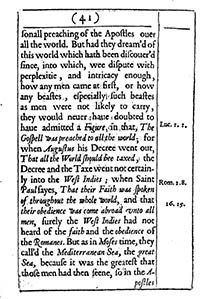
shal be silenc'd, before al things shal be
subdued to Christ, his kingdome perfi-
ted, & the last Enemy Death destroied,
the Gospell must be preached to those
men to whom ye send; to all men; fur-
der audand hasten you this blessed, this
ioyfull, this glorious consummation of
all, and happie revnion of all bodies to
their Soules, by preaching the Gospell to
those men. Preach to them Doctrinal-
ly, preach to thē Practically; Enamore
them with your Iustice, and, (as farre
as may consist with your security) your
Ciuilitie; but inflame them with your
godlinesse, and your Religion. Bring them
to loue and Reuerence the name of that
King, that sends men to teach them the
wayes of Ciuilitie in this world, but to
feare and adore the Name of that King
of Kings, that sends men to teach them
the waies of Religion, for the next
world. Those amongst you, that are
old now, shall passe out of this world
with this great comfort, that you con-
G tribu- 44
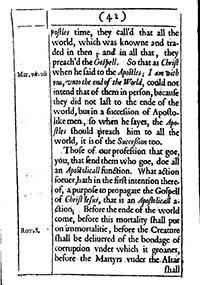 tributed to the beginning of that
Com-
tributed to the beginning of that
Com-mon Wealth, and of that Church,
though they liue not to see the groath
thereof to perfection: 1 Cor. 3. 6. Apollos watred,
but Paul planted; hee that begun the
worke, was the greater man. And you
that are young now, may liue to see
the Enemy as much empeach'd by that
place, and your friends, yea Children,
aswell accōmodated in that place, as a-
ny other. You shall haue made this I-
land, which is but as the Suburbs of the
old world, a Bridge, a Gallery to the
new; to ioyne all to that world that
shall neuer grow old, the Kingdome
of heauen, You shall add persons to
this Kingdome, and to the Kingdome
of heauen, and adde names to the
Bookes of our ChoniclesChronicles, and to the
Booke of Life. To end all, as the Orators which de-
claimd in the presence of the Roman Em-
perors, in their Panegyriques, tooke that
way to make those Emperours see, what they 45
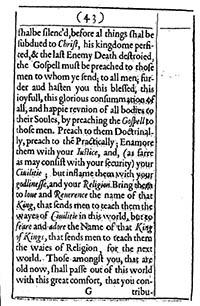
they were bound to doe, to say in those
publique Orations, that those Emporors
had done so, (for that increased the loue
of the Subiect to the Prince, to bee so
tolde, that hee had done those great
things, and then it conuayd a Counsell
into the Prince to doe them after.) As
their way was to procure things to bee
done, by saying they were done, so be-
loued I haue taken a contrary way:
for when I, by way of exhortation, all
this while haue seem'd to tell you what
should be done by you, I haue, indeed,
but told the Congregation, what hath
beene done already: neither do I speake
to moue a wheele that stood still, but
to keepe the wheele in due motion;
nor perswade you to begin, but to con-
tinue a good worke, nor propose for-
reigne, but your own Examples, to do
still, as you haue done hitherto. For,
for that, that which is especially in my
contemplation, the conuersion of the
people, as I haue receiu'd, so I can giue G2 this 46
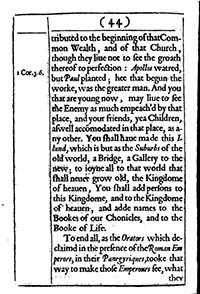
this Testimony, that of those persons,
who haue sent in moneys, and con-
ceal'd their names, the greatest part, al-
most all, haue limited their deuotion,
and contribution vpon that point, the
propagation of Religion, and the con-
uersion of the people; for the building
and beautifying of the house of GOD,
and for the instruction and education
of their young Children. Christ Iesus
himselfe is yesterday, and to day, and the
same for euer. In the aduancing of his
glory, be you so to, yesterday, and to
day, and the same for euer, here; and
hereafter, when time shall be no more,
no more yesterday, no more to day, yet
for euer and euer, you shall enioy that
ioy, and that glorie, which no ill acci-
dent can attaine to diminish, or E-
clipse it. Prayer. 47
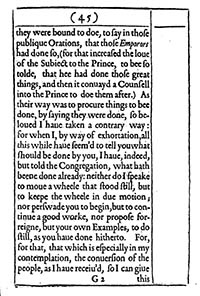 Prayer.
VVe
We
returne to thee againe, O
Prayer.
VVe
We
returne to thee againe, O GOD, with praise and prayer;
as for all thy mercies from be-
fore minutes began, to this minute,
from our Election to this present
beame of Sanctification which thou
hast shed vpon vs now. And more
particularly, that thou hast afforded vs
that great dignity, to be, this way, wit-
nesses of thy Sonne Christ Iesus, and in-
struments of his glory. Looke grati-
ously, and looke powerfully vpon this
body, which thou hast bene now some
yeares in building and compacting to-
gether, this Plantation. Looke grati-
ously vpon the Head of this Body, our
Soueraigne and blesse him with a good
disposiondisposition to this work, and blesse him
for that disposition: Looke gratious-
ly vpon them, who are as the braine of
this body, those who by his power. G3 coun- 48
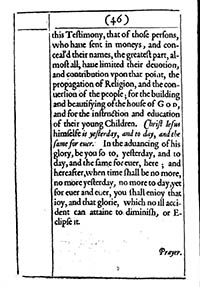
counsell, and aduise, and assist in the
Gouernment thereof: blesse them
with disposition to vnity and concord,
and blesse them for that disposition:
Looke gratiously vpon them who are
as Eyes of this Body, those of the Clergy,
who haue any interest therein: blesse
them with a disposition to preach
there, to pray heere, to exhort euery
where for the aduancement thereof, &
bless them for that disposition. Blesse
them who are the Feete of this body,
who goe thither, and the Hands of this
body, who labour there, and them
who are the Heart of this bodie, all
that are heartily affected, and declare
actually that heartinesse to this action,
blesse them all with a cheerefull dis-
position to that, and bless them for that
disposition. Bless it so in this calme,
that when the tempest comes, it may
ride it out safely; blesse it so with
friends now, that it may stand against
Enemies hereafter; prepare thy selfe a glori- 49
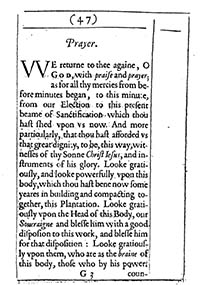
glorious haruest there, and giue vs leaue
to be thy Labourers, That so the num-
ber of thy Saints being fulfilled, wee
may with better assurance ioyne in
that prayer, Come Lord Iesus come
quickly, & so meet all in that kingdome
which the Sonne of GOD hath pur-
chased for vs, with the inestimable
price of his incorruptible bloud.
To which glorious Sonne
of GOD, &c. Amen. FINIS. Errata.
Page 10. line 14 for Three, read There.
2 l. 2 for Co read To.20 l. 7 Dele Interrogat.?
29 l. 20 Dele So.
39 l. 13 Dele Yet. Other errors there are, in mis-printing, or in transpos-
ing letters, or in misplacing Citations in the
Margin, which will not (I thinke) hinder any
willlingwilling Reader.
 Encaenia. THE FEAST OF
Encaenia. THE FEAST OF DEDICATION. CELEBRATED
AT LINCOLNES INNE,
in a Sermon there vpon Ascen-
sion day, 1623. At the Dedication of a new Chappell
there, Consecrated by the Right Reue-
rend Father in God, the Bishop
of LONDON. Preached by IOHN DONNE,
Deane of St. PAVLS. LONDON, Printed by AVG. MAT. for THOMAS IONES,
and are to bee sold at his Shop in the Strand, at
the blacke Rauen, neere vnto Saint
Clements Church. 1623.
 TO THE MASTERS
TO THE MASTERS OF THE BENCH, AND
the rest of the Honourable
Societie of LINCOLNES
INNE. IT pleased you to exer-
cise your interest in me,
and to expresse your fa-
uour to mee, in inuiting
mee to preach this Ser-
mon: and it hath plea-
sed you to doe both ouer againe, in inuiting
me to publish it. To this latter seruice I was
the more inclinable, because, though in it I
had no occasion to handle any matter of
Controuersie betweene vs, and those of the
Romane Perswasion, yet the whole body
and frame of the Sermon, is opposed a-
gainst one pestilent calumny of theirs, that A2 wee

wee haue cast off all distinction of places,
and of dayes, and all outward meanes of as-
sisting the deuotion of the Congregation.
For this vse, I am not sorry that it is made
publique, for I shall neuer bee sorry to ap-
peare plainly, and openly, and directly, with-
out disguise or modification, in the vindica-
ting of our Church from the imputations
and calumnies of that Aduersary. If it had
no publique vse, yet I should satisfie my
selfe in this, that it is done in obedience to
that, which you may call your Request, but
I shall call your Commandement vpon Your very humble Ser-
uant in Christ Iesus. IOHN DONNE.
 The Prayer before the
The Prayer before the Sermon. O Eternall, and most gracious God,
Father of our Lord Iesus Christ;
and in him, of all those that are
his, As thou diddest make him
so much ours, as that he became like vs, in
all things, sinne onely excepted, make vs
so much his, as that we may be like him, euen
without the exception of sinne, that all
our sinnes may bee buryed in his wounds,
and drowned in his Blood. And as this day
wee celebrate his Ascension to thee, bee
pleased to accept our endeauour of confor-
ming our selues to his patterne, in raysing
this place for our Ascension to him. Leane
vpon these Pinnacles, O Lord, as thou did-
dist vpon Iacobs Ladder, and hearken after
vs. Bee this thine Arke, and let thy Doue,
thy blessed Spirit, come in and out, at these
Windowes: and let a full pot of thy Man-
na, a good measure of thy Word, and an A3 effectu-

effectuall preaching thereof, bee euermore
preserued, and euermore bee distributed in
this place. Let the Leprosie of Superstition
neuer enter within these Walles, nor the
hand of Sacriledge euer fall vpon them.
And in these walles, to them that loue Pro-
fit and Gaine, manifest thou thy selfe as a
Treasure, and fill them so; To them that
loue Pleasure, manifest thy selfe, as Marrow
and Fatnesse, and fill them so; And to them
that loue Preferment, manifest thy selfe, as
a Kingdome, and fill them so; that so thou
mayest bee all vnto all; giue thy selfe
wholly to vs all, and make vs all
wholly thine. Accept our
humble thanks for
all, &c. John 1
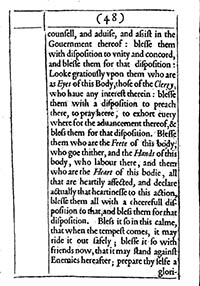 IOHN 10. 22.
And it was at Ierusalem, the
IOHN 10. 22.
And it was at Ierusalem, the
Feast of the Dedication; and it
was Winter; and Iesus walked
in the Temple in Salomons
Porch. SAaint Basill in a Ser-
mon vpon the 114.
Basill. Psalme; vpon the like
occasion as drawes
vs together now,
The consecration of
a Church, makes this the reason and
the excuse of his late comming thither
to doe that Seruice, that he stayd by the
way, to consecrate another Church:
I hope euery person heere hath done
so; consecrated himselfe, who is a B Temple 2
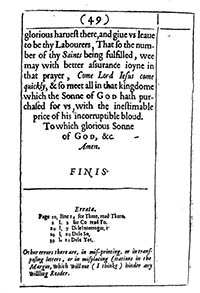
Temple of the Holy Ghost; before hee
came to assist, or to testifie the conse-
cration of this place of the Seruice of
God. Bern. Ser. 1. Nostra festiuitas hæc est, quia de Ec-
clesia nostra; sayes Saint Bernard. This
Festiuall belongs to vs, because it is the
consecration of that place, which is
ours, Magis autem nostra, quia de nobis
ipsis: But it is more properly our Festi-
uall, because it is the consecration of
our selues to Gods seruice. For, Sanctae
Animæ propter inhabitantem Spiritum;
your Soules are holy, by the inhabita-
tion of Gods holy spirit, who dwells
in them. Sancta corpora propter inhabi-
tantem animam; Your Bodies are holy,
by the inhabitation of those sanctified
Soules. Sancti parietes, propter Corpora
Sanctorum. These walles are holy, be-
cause the Saints of God meet here with-
in these walls to glorifie him. But yet
these places are not onely consecrated
& sanctified by your comming; but to
bee sanctified also for your comming; that 3
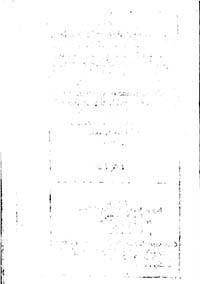
that so, as the Congregation sanctifies
the place, the place may sanctifie the
Congregation too. They must accom-
pany one another; holy persons and
holy places; If men would wash sheep
in the Baptisterie, in the Font, those
sheep were not christned. If prophane
men, or idolatrous men, pray here after
their way, their prayers are not sancti-
fied by the place. Neither if it be after
polluted, doth the place retain that san-
ctitie, which is this day to be deriued
vpon it, and to bee imprinted in it. Our Text settles vs vpon both these
considerations, Diuisio. The holy place, and
the holy person. It was the Feast of the
Dedication: there's the holinesse of the
place; And the holy person, was holi-
nesse it selfe in the person of Christ Ie-
sus, who walked in the Temple in Salo-
mons Porch. These two will bee our
two parts: And the first of these wee
shall make vp of these pieces. First, we
shall see a lawfull vse of Feasts, of Fe-
B2 stiuall 4
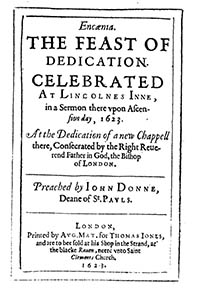 stiuall dayes. And then of other Feasts,
stiuall dayes. And then of other Feasts, then were instituted by God himselfe;
diuers were so; this was not. And
thirdly, not only a festiuall solemnizing
of some one thing, at some one time,
for the present, but an Anniuersary re-
turning to that solemnitie euery yeare;
And lastly, in that first part, this Festi-
uall in particular, The Feast of the De-
dication of the Temple: that sanctified
the place, that shall determine that
part. In the second part, The holinesse of
the person, we shall carry your thoughts
no farther, but vpon this, That euen
this holy person Iesus himselfe, would
haue recourse to this place, thus dedi-
cated, thus sanctified: And vpon this,
that hee would doe that especially at
such times, as hee might countenance
and authorise the Ordinances and In-
stitutions of the Church, which had
appointed this Festiuall. And this, sayes
the Text, he did in the Winter: First, Etsi
Hiems, though it were Winter, hee came 5
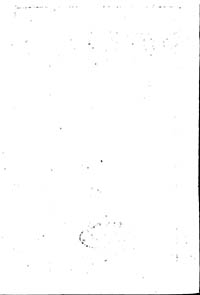
came, and walked in the Porch, a little
inconuenience kept him not off: And,
Quia Hiems, because it was Winter, he
walked in the Porch which was coue-
red, not in the Temple which was o-
pen. So that heere with modestie, and
without scandall he condemned not
the fauouring of a mans health, euen
in the Temple, And it was at Ierusalem,
the Feast of the Dedication; and it was
Winter; and Iesus walked in the Temple in
Salomons Porch. In our first part, 1. Part. Festa. Holy places, wee
looke first vpon the times of our mee-
ting there, Holy dayes. The root of all
those is the Sabboth, that God planted
himselfe, euen in himselfe, in his owne
rest, from the Creation. But the root,
and those branches which grow from
that root, are of the same nature, and
the same name: And therefore as well
of the flower, as of the root of a Rose,
or of a Violet, we would say, This is a
Violet, this is a Rose; so as well to o-
B3 ther 6
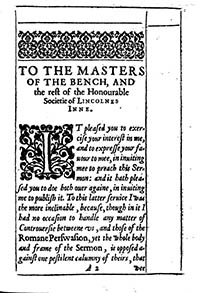 ther Feasts of Gods
institution, as to the
ther Feasts of Gods
institution, as to the first Sabboth, God giues that name; hee
cals those seuerall Feasts which he in-
stituted, Sabboths; enioynes the same
things to be done vpon them, inflicts
the same punishments vpon them that
breake them. Leuit. 23. So that there is one Mo-
ralitie, that is the soule of all Sabboths,
of all Festiualls; howsoeuer all Sab-
boths haue a ceremoniall part in them,
yet there is a Morall part that inani-
mates them all; they are elemented of
Ceremonie, but they animated with
Moralitie. And that Moralitie is in them
all, Rest: for if Adam could name crea-
tures according to their nature, God
could name his Sabboth according to
the nature of it, and Sabboth is Rest. It
is a Rest of two kindes; our rest, and
Gods rest. Our rest is the cessation from
labour on those dayes; Gods rest, is our
sanctifying of the day: for so in the
religious sacrifice of Noah, when hee
was come out of the Arke, Genes. 8. God is said to 7
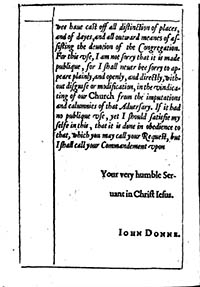
to haue smelt, Odorem quietis, the sauour
of rest: vpon those dayes we rest from
seruing the world, and God rests in our
seruing of him. And as God takes a
tenth part of our goods, in Tythes, but
yet he takes more too, he takes Sacrifi-
ces, so though he take a seuenth part
of our time in the Sabboth, yet he takes
more too, he appoints other Sabboths,
other Festiualls, that he may haue more
glory, and we more Rest: for all wher-
in those two concurre, are Sabboths
Vacate & videte quoniam ego sum Domi-
nus sayes God. Psal. 46. 10 First vacate, rest from
your bodily labours, distinguish the
day, and then videte, come hither into
the Lords presence, and worship the
Lord your God, sanctifie the day: And
in all the Sabboths there is still a Cessate,
Leuit. 23. and a Humiliate animas, bodily rest, and
spirituall sanctifying of the day. Holy
dayes then, that is, dayes seposed for
holy vses, and for the outward & pub-
like seruice of God, are in Nature, and in 8
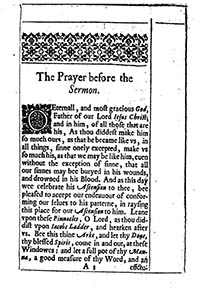
in that Morall Law which is written in
the heart of man. That such dayes
there must be is Morall; and this is Mo-
rall too, that all things in the seruice of
God bee done in order; and this also,
that obedience be giuen to Superiours,
in those things wherein they are Supe-
riors. And therfore it was to the Iewes,
as well Morall, to obserue the certaine
dayes which God had determined, as to
obserue any at all. Not that Gods com-
mandement limitting the dayes, infu-
sed a Moralitie into those particular
dayes: for Moralitie is perpetuall; and if
that had been Morall, it must haue been
so before, and it must bee so still; Gods
determining the dayes did not infuse,
not induce a Moralitie there, but it a-
wakened a former Moralitie, that is, an
obedience to the commandement, for
that time, which God had appoynted
that for them; for this Obedience, and
Order is perpetuall, and so, Morall. We
depart therfore from that error, which those 9
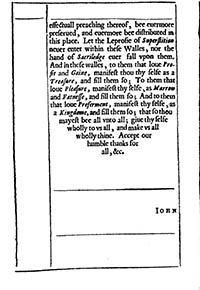
those ancient Heretiques, the Ebionites
begun, and some laboured to refresh in
Saint Gregories time, and which conti-
nues in practise in some places of the
world still; To obserue both the Iewes
Sabbath, and the Christians, Satterday,
and Sunday too; because the Sabboth is
called Pactum sempiternum: Exod. 31. for to that
any of Saint Augustines Answeres will
serue; either that it is called euerlasting,
because it signified an euerlasting rest;
(where be pleased to note by the way,
that Holy dayes, Sabbaths, are not onely
instituted for Order, but they haue their
Mystery, and their Signification; for Holy
dayes, Col. 2. 16. (as the Text calls them there)
and New Moones, and the Sabboth, were
but shadowes of things to come:) or
else the Sabboth was called euerlasting
to them, because it bound them euer-
lastingly, and they might neuer inter-
mit it, as some other ceremonies they
might. But their Sabboths bind not vs;
we depart from them who thinke so; C and 10
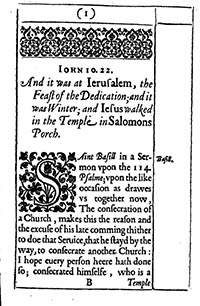
and so we doe from them, who think
we are bound to no Festiualls at all, or
at least to none but the Sabboth. For
God requires as much seruice from vs,
as from the Iewes, and to them hee en-
larged his Sabboths, and made them di-
uers. But those were of Gods immediat
institution: but all that the Iewes obser-
ued were not so; and thats our next
consideration, Festiualls instituted by
the Church. At first, Sine Man--
dato. when God was alone, it is
but Faciamus, let vs, vs the Trinity make
man. This was, when God was, as we
may say, in Coelibatu. But after God hath
taken his spouse, maried the Church, then
it is Capite nobis vulpes, Cant. 2. 15 doe you take the
little Foxes, you the Church; for our vines
haue grapes; the vines are ours; yours
and mine sayes Christ to the Church: and
therfore do you looke to them, as well
as I. The Tables of the law God him-
selfe writ, and gaue them written to
Moses: he left none of that to him; not a power 11
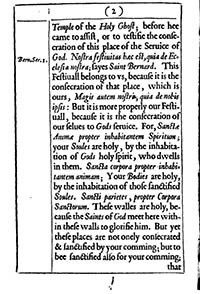
a power to make other Lawes like
those lawes: but for the Tabernacle,
which concern'd the outward worship
of God, Exod. 25. 9. that was to be made by Moses,
Iuxta similitudinem, according to the pa-
terne which God had shewed him. God
hath giuen the Church a paterne of Ho-
ly dayes, in those Sabboths which hee
himselfe instituted, and according to
the paterne, the Church hath instituted
more: Aug. and Recte festa Ecclesiæ colunt qui
se Ecclesiæ filios recognoscunt: They who
disdaine not the name of sonnes of the
Church, refuse not to celebrate the daies
which are of the Churches institution.
There was no immediate commande-
ment of God for that Holy day, which
Mordechai, Ester 9. 23 by his letters establish'd; but
yet the Iewes vndertooke to do as Mor-
dechai had written to them. There was
no such commandement for this Holy
day, in the Text; and yet that was ob-
serued, as long as they had any beeing.
And where the reason remaines, the C2 practise 12
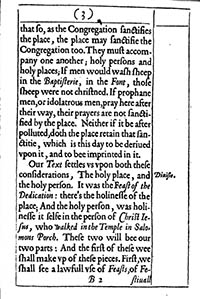
practise may; The Iewes did, we may
institute new Holy dayes. And not one-
ly transitory daies, for a present thanks
giuing for a present benefit, but Anni-
uersaries, perpetuall memorials of Gods
deliuerances. And thats our next step. Both the Holy dayes, Anniuer-
saria. which we na-
med before, which were instituted
with out speciall Commaundement
from God, were so. That of Mordechai,
he commanded to be kept euery yeare
for two dayes, and this in the Text, Iu-
das Maccabeus commanded to be kept
yearely for eight dayes, which was
more then was appoynted to any of
the Holy dayes, instituted by God him-
selfe, for the Festiuall alone. According
to which paterne, Felix. one Bishop of Rome,
ordained that the Festiuals of the De-
dication of Churches should bee yeare-
ly celebrated in those places; Greg. and an-
other extended the Festiuall to eight
dayes; at least at the first dedication
thereof, if not euery yeare: that God might 13
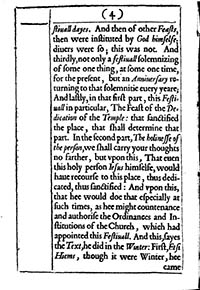
might not onely be put into the posses-
sion of the place, but setled in it. God
by Moses made the children of Israel a
Song, Deut. 31. 19 because, as hee sayes, howsoeuer
they did by the Law, they would ne-
uer forget that Song, & that Song should
be his witnesse against them. There-
fore would God haue vs institute so-
lemne memorialls of his great deliue-
rances, that if when those dayes come
about, we doe not glorifie him, that
might aggrauate our condemnation.
Euery fift of August, the Lord rises vp,
to hearken whether we meet to glori-
fie him, for his great deliuerance of his
Maiesty, before he blest vs with his pre-
sence in this Kingdome: and when
he finds vs zealous in our thankes for
that, he giues vs farther blessings. Cer-
tainly he is vp as early euery fift of No-
uember, to hearken if we meet to glori-
fie him for that deliuerance still; and if
hee should finde our zeale lesse then
heretofore, hee would wonder why. C3 Gods 14
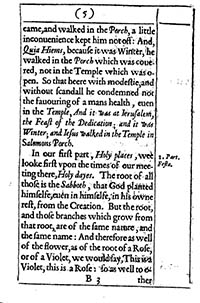
Gods principall, his radicall Holy day,
the Sabbath, had a weekly returne; his
other Sabbaths, instituted by himselfe,
and those which were instituted by
those paternes, that of Mordechai, that
of the Maccabees, & those of the Christi-
an Church, They all return once a yeare.
God would keepe his Courts once a
yeare, and see whether wee make our
apparances as heeretofore; that if not,
hee may know it. Feastes in generall,
Feastes instituted by the Church alone,
Feasts in their yearely returne and ob-
seruation, haue their vse, and particu-
larly those Feasts of the Dedication of
Churches, which was properly and li-
terally the Feast of this Text. It was the
Feast of Dedication. As it diminishes not, preiudices not
Gods Eternitie, Encænia. that wee giue him his
Quando, certaine times of Inuocation,
God is not the lesse yesterday, Temple. and to day,
and the same for euer, because wee meet
here to day, and not yesterday, so it di-
mini- 15
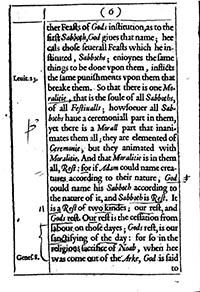
minishes not, preiudices not Gods Vbi-
quitie and Omnipresence, that wee giue
him his Vbi, certaine places for Inuo-
cation. Thats not the lesse true, that
the most High dwells not in Temples made
with handes, Acts 7. 48. though God accept at our
hands our dedication of certaine pla-
ces to his seruice, & manifest his wor-
king more effectually, more energeti-
cally in those places, then in any other.
for when we pray, Our Father which art
in Heauen, Chrysostome. It is not (sayes Saint Chryso-
stome) that wee deny him to bee heere,
where wee kneele when we say that
Prayer, but it is that we acknowledge
him to be there, where he can graunt,
and accomplish our prayer. It is as Ori-
gen hath very well expressed it, Origen. Vt in
melioribus mundi requiramus Deum: That
still wee looke for God in the best pla-
ces; looke for him, as he heares our pe-
titions, here, in the best places of this
world, in his House, in the Church;
looke for him as he graunts our petiti-
on, 16
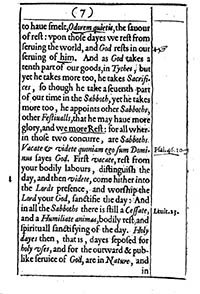 on, in the best place of the next world,
on, in the best place of the next world, at the right hand, and in the bosome of
the Father. Deut. 30. 13 When Moses sayes that the
word of God is not beyond Sea, he addes,
It is not so beyond Sea, as that thou must
not haue it without sending thither. When
he sayes there, it is not in heauen, he adds,
not so in heauen, as that one must goe vp,
before hee can haue it. The word of
God, is beyond Sea, the true word, truly
preached in many true Churches there,
but yet we haue it here, within these
Seas too; God is in Heauen, but yet hee
is here, within these walles too. And
therefore the impietie of the Maniche-
ans exceeded all the Gentiles, who con-
cluded the God of the Old Testament to
be an impotent, an vnperfect God, be-
cause hee commaunded Moses first to
make him a Tabernacle, and then Salo-
mon to make him a Temple, as though
he needed a House. God does not need
a house, but man does need, that God
should haue a House. And therefore the 17
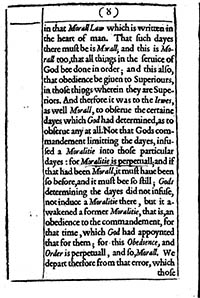
the first question, that Christs first Dis-
ciples asked of him, was Magister, vbi
habitas, they would know his standing
house, where he hath promised to bee
alwaies within, and where at the ring-
ing of the Bell, some body comes to
answere you, to take your errand, to
offer your Prayers to God, to returne
his pleasure in the preaching of his
Word to you. The many and heauy
Lawes, with which sacred and secular
stories abound, against the prophana-
tion of places, appropriated to Gods
seruice, and that religious custome, that
passed almost through all ciuill Nati-
ons, that an oath, which was the bond
between man, and man, had the stron-
ger Obligation, if that were taken in
the Church, in the presence of God, (for
such was the practise of Rome towards
her enemies, Tango ar as inediosqueignes,
to make their vowes of hostility in the
Church, and at time of diuine Seruice,
(and such is their practise still, they seale 18
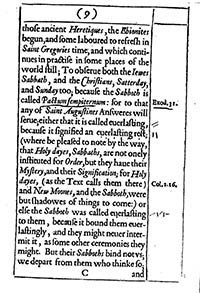
seale their Treasons in the Sacrament)
such was Romes practise towards o-
thers, and such was the practise of o-
thers towards Rome, (for so Anniball
sayes, that his father Amilcar swore
him at the Altar, that he should neuer
bee reconciled to Rome, (And such is
your practise still, as often as you meet
here, you renew your band to God,
that you will neuer bee reconciled to
the Superstitions of Rome) all these, and
all such as these, and such as these are
infinite, heap vp testimonies, that euen
in Nature there is a disposition to ap-
ply, and appropriate certaine places to
Gods seruice. And this impression in
nature is illustrated in the Law, as the
time, so the place is distinguished, Yee
shall keepe my Sabboths, Leui. 19. 30 there is the time,
and you shall reuerence my Sanctuary,
there is the place. But that they may
be reuerenced, that they may bee San-
ctuaries, they are to be sanctified; and
thats the Encaenia, the Dedication. D Euen 19
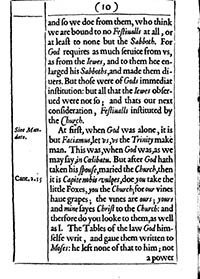 Euen in those things which accrue
Euen in those things which accrue vnto God, Encænia. and become his, by another
title, then as he is Lord of all, by Crea-
tion, that is, by appropriation, by dedi-
cation to his vse and Seruice, There is
a Lay Dedication, and an Ecclesiasticall
Dedication. I hope the distinction of
Laytie, and Clergie, the words, scan-
dalize no man. Luther, and Caluin
too might haue iust cause to decline
the words, as they did; when so much
was ouer-attributed to that Clergie
which they intend, as that they were
so Sors Domini, the Lords portion, as that
the world had no portion in them,
and yet they had the greatest portion
of the world; and howe little soe-
uer they had to doe with God, yet no
State, no King might haue any thing
to doe with them. But, as long as
we declare, that by the Layetie we in-
tend the people glorifying God in their
secular callings, and by the Clergie, per-
sons seposed by his ordinance, for spi-
D2 ritual 20
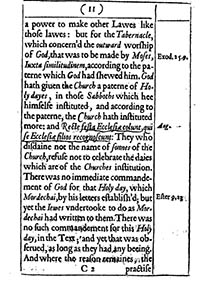 ritual functions, The Layetie no farther
ritual functions, The Layetie no farther
remoou'd then the Clergie, The Clergie
no farther entitled then the Layetie, in
the blood of Christ Iesus, neither in the
effusion of that blood vpon the Crosse,
nor in the participation of that blood
in the Sacrament, and that an equall
care in Clergie, and Layetie, of doing the
duties of their seuerall callings, giues
them an equall interest in the ioyes,
and glory of heauen, I hope no man is
scandaliz'd with the names. The Lay
Dedication then is, the voluntary sur-
rendring of this piece of ground thus
built, to God. For we must say, as Saint
Peter said to Ananias, Acts 5. 4. Whiles it remain'd,
was that not your owne? and now, when
that is raised (sauing that there was
Dedicatio Intentionalis, a purpose from
the beginning to appropriate it, to this
holy vse) might you not, till this houre,
haue made this roome your Hall, if
you would? But this is your Dedica-
tion, that you haue cheerfully pursued your 21
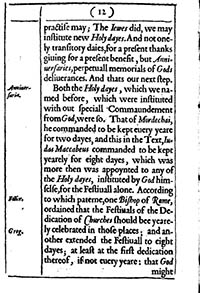
your first holy purposes, and deliuer
now into the hands of this seruant of
God, the Right Reuerend Father the Bi-
shop of this See, a place to be presented
to God for you, by him, not misbecom-
ming the Maiestie of the great God,
who is pleased to dwell thus amongst
vs. What was spent in Salomons Tem-
ple is not told vs. What was prepared,
before it was begun, is such a summe,
as certainly, if all the Christian Kings
that are, would send in all that they
haue, at once, to any one seruice, all
would not equall that summe. They
gaue there, till they who had the ouer-
seeing therof, complain'd of the abun-
dance, and proclaim'd an abstinence.
Yet there was one, who gaue more
then all they; for Christ sayes the poore
widdow gaue more then all the rest,
because she gaue all she had. There is a
way of giuing more then she gaue; &
I, who by your fauours was no strāger
to the beginning of this work, and D3 an 22
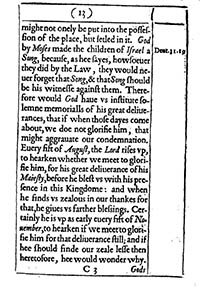
an often refresher of it to your me-
mories, and a poore assistant in laying
the first stone, the materiall stone, as I
am now, a poore assistant again in this
laying of this first formall Stone, the
Word & Sacrament, and shall euer de-
sire to be so in the seruice of this place,
I, I say, can truly testifie, that you (spea-
king of the whole Societie together of
the publike stock, the publike treasury,
the publike reuenue) you gaue more
then the widow, who gaue all, for you
gaue more then all. A stranger shall not
entermeddle with our ioy, as Salomon saies:
strangers shall not know, how ill we
were prouided for such a work, when
we begun it, nor with what difficul-
ties we haue wrastled in the way; but
strangers shall know to Gods glory,
that you haue perfected a work of full
three times as much charge, as you pro-
posed for it at beginning: so bounti-
fully doth God blesse, and prosper in-
tentions to his glory, with enlarging your 23
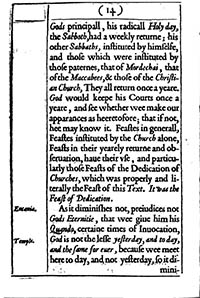
your hearts within, and opening the
hearts of others, abroad. And this is
your Dedication, and that which with-
out preiudice, and for distinction, wee
call a Lay Dedication, though from reli-
gious hearts, and hands. There is another Dedication; Ecclesiastica that we
haue call'd Ecclesiasticall, appointed by
God, so as God speaks in the ordinances,
and in the practise of his Church. Haere-
ditary Kings are begotten & conceiu'd
the naturall way; but that body which
is so begotten of the blood of Kings, is
not a King, no nor a man, till there bee
a Soule infused by God. Here is a House,
a Child conceiu'd (wee may say borne)
of Christian parents, of persons religi-
ously disposed to Gods glory; but yet,
that was to receiue another influence,
an inanimation, a quickening, by ano-
ther Consecration. Oportet denuo nasci,
holds euen in the children of Christian
parents; when they are borne, they must
be borne again by Baptisme: when this place 24
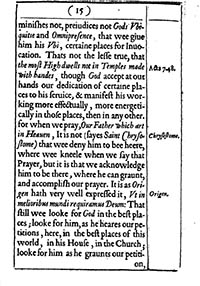
place is thus giuen by you, for God, opor-
tet denuo dari, it must be giuen againe to
God, by him, who receiues it of you. It
must; there seems a necessitie to be im-
plied, because euen in Nature, there was
a consecration of holy places; Iacob in
his iourney, Gen. 28. 20. before the Law, consecrated
euen that stone, which he set vp, in in-
tention to build God a House there. In
the time of the Law, Num. 7. 1. this Feast of Dedi-
cation, was in practise; first in the Ta-
bernacle; that and all that appertain'd to
it, was annointed, and sanctified: So
was Salomons Temple after; so was that
which was reedified after their return
from Babylon, and so was this in the
Text, after the Heathen had defiled and
profan'd the Altar thereof, and a new
one was erected by Iudas Maccabeus.
Thus in Nature, thus in Law, and thus
far thus in the Gospell too: that as sure
as wee are that the people of God had
materiall Churches in the Apostles first
times, so sure we are, that those places had 25
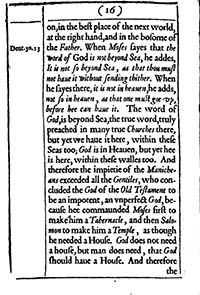
had a Sanctitie in them. If that place
of Saint Paul, 1 Cor. 11. 22 Despise yee the Church of
God? be to be vnderstood of the locall,
of the materiall Church, and not of the
Congregation, you see there is a rebuke
for the prophanation of the place, and
consequently a sanctity in the place. But
assoone as the Church came euidently
by the fauour of Princes, to haue liberty
to make lawes, and power to see them
practised, it was neuer pretermitted to
consecrate the places. Before that, we
find an ordinance by Pope Hyginus (he
was within 150. after Christ, and the
eighth Bishop of that See after Saint Pe-
ter) euen of particulars in the Conse-
crations. But after, Athanas. Athanasius in his A-
pologie to Constantius, makes that prote-
station for all Christians, That they neuer
meet in any Church, till it bee consecrated:
And Constantine the Emperour least hee
should be at any time vnprouided of
such a place, (as we read in the Ecclesia-
sticall story) in all his warres, carried a-
bout 26
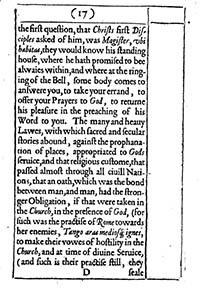 bout with him a Tabernacle which was
bout with him a Tabernacle which was consecrated: In Nature, in the Law, in
the Gospell, in Precept, in Practise, these
Consecrations are established. This they did. Vsus. But to what vse did
they consecrate them? not to one vse
only; and therfore it is a friuolous con-
tention, whether Churches be for prea-
ching, or for praying. But if Consecration
be a kind of Christning of the Church,
& that at the Christning it haue a name,
wee know what name God hath ap-
poynted for his House, Domus mea, Do-
mus orationis vocabitur. My House shall
bee called the House of Prayer. And how
impudent and inexcusable a falshood
is that in Bellarmine, That the Lutherans
and Caluinistes doe admit Churches for
Sermons and Sacraments, Sed reprehen-
dunt quod fiant ad orandum, They dislike
that they should be for Prayer: when
as Caluin himselfe, (who may seeme to
bee more subiect to this reprehension
then Luther) (for there is no such Litur-
gie 27
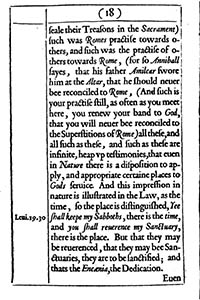 gie in the
Caluinists Churches, as in the
gie in the
Caluinists Churches, as in the Lutheran) yet in that very place which
Bellarmine cites, sayes Conceptae preces in
Ecclesia Deo gratae; and for singing in
Churches, (which in that place of Caluin
cannot be only meant of Psalmes, for it
was of that manner of singing, which
being formerly in vse in the Easterne
churches, S. Ambrose, in his time, brought
into the Church of Millan, and so it was
deriud ouer the Western churches, which
was the modulation and singing of
Versicles and Antiphons and the like)
this singing, sayes Caluin, was in vse a-
mongst the Apostles themselues, Et san-
ctissimum & saluberimum est institutum.
l. 3. 20.
§ 32. It was a most holy and most profitable Insti-
tution. Still consider Consecration to
be a Christning of the place; and though
we find them often called Templa prop-
ter Sacrificia, for our sacrifices of praier,
and of praise, & of the merits of Christ,
and often called Ecclesiae ad conciones,
Churches, in respect of congregations, for 28
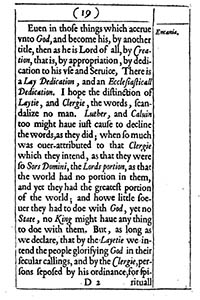
for preaching, and often call'd Martyria,
for preseruing with respect, and honor
the bodies of Martyrs, and other Saints
of God, there buried, & often, often, by
other names, Dominica, Basilica, and the
like, yet the name that God gaue to his
house, is not Concionatorium, nor Sacra-
mentarium, but Oratorium, the House of
Prayer. And therefore without preiu-
dice to the other functions too, (for as
there is a vae vpon me, Si non Euangeli-
zauero, If I preach not my selfe, so may
that vae be multiplied vpon any, who
would draw that holy ordinance of
God into a dis-estimatiō, or into a slack-
nesse,) let vs neuer intermit that dutie,
to present our selues to God in these
places, though in these places there bee
then, no other Seruice, but Common
prayer. For then doth the House an-
swere to that name, which God hath
giuen it, if it be a house of Prayer. Thus then were these places to re-
ceiue a double Dedication; Modus. a Dedica-
tion 29
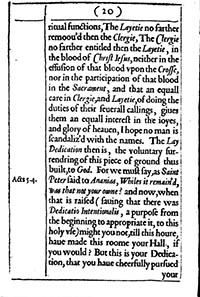 tion, which was a Donation from the
tion, which was a Donation from the
Patron, a Dedication which was a con-
secration from the Bishop, for to his
person, and to that ranke in the Hie-
rarchy of the Church, the most ancient
Canons limited it; and to those purpo-
ses, which wee haue spoken of; of
which, Prayer is so farre from being
none, as that there is none aboue it. A
little should be said, (before wee shut
vp this part) of the manner, the forme
of Consecrations. In which, in the Pri-
mitiue Church, assoone as Consecrations
came into free vse, they were full of
Ceremonies. And many of those Cere-
monies deriu'd from the Iewes: and not
vnlawfull, for that. The Ceremonies of
the Iewes, which had their foundation
in the prefiguration of Christ, and were
types of him, were vnlawfull after
Christ was come; because the vse of
them, then, implyed a deniall or a
doubt of his being come. But those
Ceremonies, which, though the Iewes E3 vsed 30
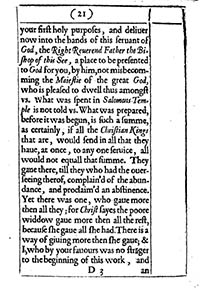
vsed them, had their foundation in Na-
ture, as bowing of the knee, lifting vp
the eyes, and hands, and many, very
many others, which either testified
their deuotion that did them, or ex-
alted their deuotion that sawe them
done, are not therefore excluded the
Church, because they were in vse a-
mongst the Iewes. That Pope whom
we named before, Hyginus, the eighth
after Saint Peter, he instituted, Ne Ba-
silica sine Missa consecretur. That no
Church bee consecrated without a Masse.
If this must binde vs, to a Masse of the
present Romane Church, it were hard;
and yet not very hard truely; for they
are easily had. But that word, Masse,
is in Saint Ambrose, in Saint Augustine
in some very ancient Councels; and sure-
ly intends nothing, to this purpose, but
the Seruice, the Common Prayer of
the Church, then in vse, there. And
when the Bishop Panigarola sayes in
his Sermon vpon Whitsunday, that the Holy 31
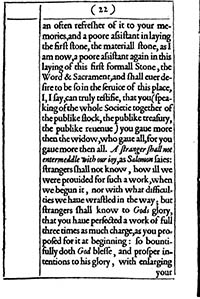
Holy Ghost found the blessed Virgin
and the Apostles at Masse, I presume hee
meanes no more, then that they were
mett at such publique Prayer, as at
those times they might make. Sure
Pope Clemens, and Pope Hyginus meane
the same thing, when one sayes Missa
consecretur, and the other Diuinis Preci-
bus: One sayes, Let the Consecration bee
with a Masse, the other, with Diuine
Seruice; the Liturgie, the Diuine Ser-
uice was then the Masse. In a word, a
constant forme of Consecrations, wee
finde none that goes through our Ri-
tualls: the Ceremonies were still more
or lesse, as they were more or lesse ob-
noxious, or might bee subiect to scan-
dalize, or to be mis-interpreted. And
therefore I am not heere either to di-
rect, or so much as to remember, that
which appertaines to the manner of
these Consecrations; onely in concur-
ring in that, which is the Soule of all,
humble and heartie prayer, that God will 32
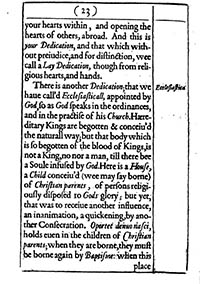
will heare his Seruants in this place, I
shall not offend to say, that I am sure
my zeale is inferiour to none. And
more I say not of the first Part, The
Holy place; and but a little more, of
the other; though at first it were pro-
posed for an equall part, The Holy
Person, That at the Feast of the Dedi-
cation, Iesus walked in the Temple in Sa-
lomons Porch. In this second part, 2. Part. wee did not
spread the words, not shed our consi-
derations vpon many particulars: the
first was, that euen Iesus Jesus
in Templo. himselfe had
recourse to this Holy place. In the new
Ierusalem, in Heauen, there is no Tem-
ple. Apo. 21. 22 I saw no Temple there sayes Saint
Iohn: for the Lord God Almightie, and the
Lambe are the Temple of it. In Heauen,
where there is no danger of falling,
there is no need of assistance. Heere
the Temple is called Gnazar, 2. Paral. 4. 9 that is Au-
xilium: A Helper: the strongest that
is, needs the helpe of the Church: And it 33
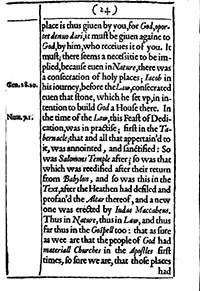
it is called Sanctificium, by Saint Hie-
rom, Psal. 78. 69. a place that is not onely made ho-
ly by Consecration, but that makes
others holy by GOD in it. And there-
fore Christ himselfe, whose person and
presence might consecrate the Sanctum
Sanctorum, would yet make his often
repayre to this Holy place; not that hee
needed this subsidie of Locall holinesse
in himselfe, but that his example might
bring others who did neede it; and
those who did not; and, that euen his
owne Preaching might haue the be-
nefite and the blessing of Gods Ordi-
nance in that place, hee sayes of him-
selfe, Math. 26. Quotidie apud vos sedebam do-
cens in Templo, and Semper docui in Sy-
nagoga, & in Templo; as in the Actes,
the Angell that had deliuered the A-
postles out of prison, sends them to
Church, Actes 5. Stantes in Templo loquimini ple-
bi. The Apostles were sent to preach,
but to preach in the Temple, in the place
appropriated and consecrated for that F holy 34
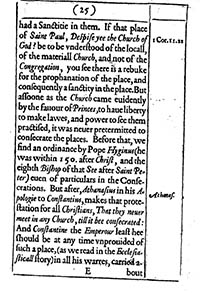
holy vse and employment. He came to this place, Tempus. and he came
at those times, which no immediate
command of God, but the Church had
instituted. Facta sunt Encaenia, sayes the
Text; It was the Feast of the Dedica-
tion. Wee know what Dedication
this was; That of Salomon was much
greater; A Temple built where none
was before; That of Esdras at the re-
turne was much greater then this, An
intire reedification of that demoli-
shed Temple, where it was before.
This was but a zealous restoring of
an Altar in the Temple: which hauing
beene prophaned by the Gentiles, the
Iewes themselues threw downe, and
erected a new, and dedicated that.
Salomons Dedication is called a Feast,
2 Chr. 5. 3. a Holy day: by the very same name that
the Feast of vnleauened bread, and the
Feast of the Tabernacle is called so of-
ten in Scripture, which is Kag. The
Dedication of Ezra Ezra 6. 16. is sufficiently de-
clared 35
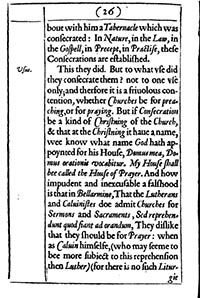 clared to bee a solemne Feast
too. But
clared to bee a solemne Feast
too. But neither of these Feastes, though of
farre greater Dedications, were An-
niuersarie; neither commanded to be
kept euery yeare; and yet this, which
was so much lesser then the others, the
Church had put vnder that Obligation,
to bee kept euery yeare; and Christ
himselfe contemnes not, condemnes
not, disputes not the institution of the
Church. But as for matter of doctrine
hee sends euen his owne Disciples, to
them who sate in Moses Chayre, so for
matter of Ceremony, he brings euen
his owne person, to the celebrating, to
the authorizing, to the countenancing
of the Institutions of the Church, and
rests in that. Now it was Winter, sayes the Text:
Christ came etsi Hyems, Etsi Hyems though it were
Winter; so small an inconuenience
kept him not off. Beloued, it is not
alway colder vpon Sunday, then vpon
Satterday; nor at any time colder in F2 the 36
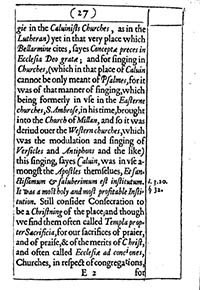
the Chappell; then in Westminster Hall.
A thrust keepes some off in Summer;
and colde in Winter: and there are
more of both these in other places,
where for all that, they are more con-
tent to be. Remember that Peter was
warming himselfe, and hee denyed
Christ. They who loue a warme bed,
let it bee a warme Studie, let it bee a
warme profit, better then this place,
they deny CHRIST in his Institution.
That therefore which CHRIST sayes,
Mat. 24. 20. Pray that your flight bee not in the Win-
ter, nor vpon the Sabboth; we may ap-
ply thus, Pray that vpon the Sabboth
(I tolde you at first, what were Sab-
boths,) the Winter make you not flie,
not abstaine from this place. Put off
thy shooes, Exod. 35. sayes God to Moses, for the
place is holy ground. When Gods ordi-
nance by his Church call you to this ho-
ly place, put off those shoes, all those
earthly respects, of ease or profit, Christ
came, Etsi Hyems. But 37
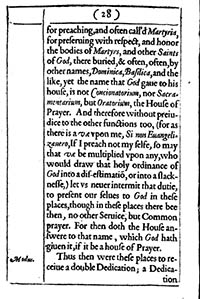 But then, Quia Hyems, Quia Hyems Because it
But then, Quia Hyems, Quia Hyems Because it was Winter, Hee did walke in Salo-
mons Porch, which was couered, not in
Atrio, in that part of the Temple, which
was open, and expos'd to the weather.
We doe not say, that infirme and weak
men, may not fauour themselues, in a
due care of their health, in these places.
That he who is not able to raise him-
selfe, must alwayes stand at the Gospell,
or bow the knee at the name of Iesus,
or stay some whole houres, altogether
vncouered heere, if that increase infir-
mities of that kinde. And yet Courts
of Princes, are strange Bethesdaes; how
quickly they recouer any man that is
brought into that Poole? How much
a little change of ayre does? and how
well they can stand, and stand bare
many houres, in the Priuy Chamber,
that would melt and flowe out into
Rhumes, and Catarrs, in a long Gospell
heere? But, Citra Scandalum, a man
may fauour himselfe in these places: F3 but 38
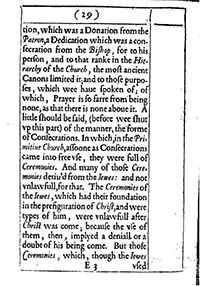
but yet this excuses not the irreuerent
manner which hath ouertaken vs in
all these places; That any Master may
thinke himselfe to haue the same li-
bertie heere, as in his owne house, or
that that Seruant, that neuer puts on
his hat in his Masters presence all the
weeke, on Sunday, when hee and his
Master are in Gods presence, should
haue his hat on perchance before his
Masters. Christ shall make Master and
Seruant equall; but not yet; not heere;
nor euer, equall to himselfe, how euer
they become equall to one another.
Gods seruice is not a continuall Martyr-
dome, that a man must bee heere, and
here in such a posture, and such a man-
ner, though hee dye for it; but Gods
House is no Ordinary neither; where
any man may pretend to doe what he
will, and euery man may doe, what
any man does. Christ slept in a storme;
I dare not make that generall; let all
doe so. Christ fauoured himselfe in the 39
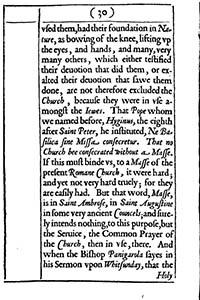
the Church; I dare not make that ge-
nerall neither: to make all places e-
quall, or all persons equall in any
place. Tis time to end. Saint Basill Basil. him-
selfe, as acceptable as hee was to his
Auditory, in his second Sermon vpon
the 14. Psalme, takes knowledge that
hee had preached an houre, and there-
fore broke off: I see it is a Compasse,
that all Ages haue thought sufficient.
But as we haue contracted the consi-
deration of great Temples, to this lesser
Chappell, so let vs contract the Chappell
to our selues: Et facta sint Encaenia no-
stra, let this be the Feast of the Dedica-
tion of our selues to God. Christ calls
himselfe a Temple, Iohn 2. 19. Soluite templum hoc:
Destroy this Temple. 1 Cor. 3. 16.
& 6. 19. And Saint Paul
calls vs so twice; Know ye not that ye are
the Temples of the Holy Ghost? Facta sint
Encaenia nostra: Encaenia signifies Reno-
uationem, a renewing: and Saint Augu-
stine Aug. sayes that in his time, Si quis noua-
tunica 40
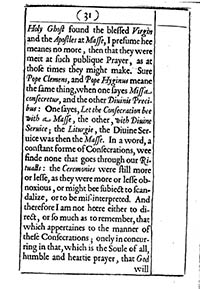 tunica indueretur, Encaeniare diceretur. If
tunica indueretur, Encaeniare diceretur. If any man put on a new garment, hee called it
by that name, Encaenia sua. Much more
is it so, if wee renew in our selues the
Image of God, and put off the Olde man,
and put on the Lord Iesus Christ. This
is truly Encaeniare, to dedicate, to renew
our selues: and so Nazian. Nazian. in a Sermon,
or Oration, vpon the like occasion as
this, calls, Conuersionem nostram, Encaenia,
our turning to God, in a true repen-
tance, or renewing, our dedication. Let
mee charge your memories, but with
this note more, That when God forbad
Dauid the building of an House, Be-
cause hee was a man of blood, at that time
Dauid had not embrued his hands in
Vriahs blood; nor shed any blood, but
lawfully in iust warres; yet euen that
made him vncapable of this fauour to
prouide God a house. Some callings are
in their nature more obnoxious, and
more exposed to sinne, then others are:
accompanied with more tentations; & so 41
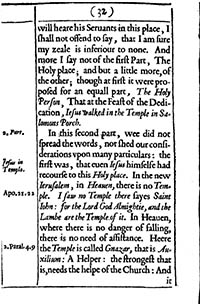
so retard vs more in holy duties. And
therefore as there are particular sinnes
that attend certaine places, certaine ages,
certaine complexions, and certaine voca-
tions, let vs watch our selues in all those,
and remember that not only the high-
est degrees of those sinns, but any thing
that conduces therunto, prophanes the
Consecration, and Dedication of this
Temple, our selues, to the seruice of God;
it annihilates our repentance, and fru-
strates our former reconciliations to
him. Almighty God worke in you a perfit
dedication of your selues at this time; that so,
receiuing it from hands dedicated to God,
hee whose holy Office this is, may present ac-
ceptably this House to God in your behalfes,
and establish an assurance to you, that
God will be alwayes present with
you and your Succession
in this place. Amen. G